Essential Guides
Ocean Mapping
New to Yachting

Yacht Captain jobs
Your new adventure awaits.

Photo of Captain Sally-Ann Konigkramer
Explore more yacht roles
Other essential guides.

Mandatory certificates

What you need to know about B1/B2 visa

Download yacht crew CV templates

How to write a memorable yachting CV

How to prepare for a yacht interview?

What are the two main yachting seasons?

Big yacht crew hubs you should know about

Is yachting the right choice for me?

Yacht crew salary guide
Leading from the helm as a Captain is undoubtedly one of the most fulfilling and rewarding career paths in the superyacht industry.
The Captain holds the most senior position onboard a yacht and the one responsible for the overall operation of the yacht, the safety of its crew, owners and guests. It’s an all-encompassing position where excellent navigational capabilities are coupled with a high level of administrative and managerial skills.
The role differs depending on the size of the yacht, its usage and its cruising itinerary. Captains on smaller yachts need to be hands-on problem solvers and multitaskers. Under 35m, for example, the Captain’s position also encompasses the role of an Engineer, whilst on larger yachts the Captain has dedicated teams and Heads of Departments under their command.
What does a yacht Captain do? | Yacht Captain Job Description
Commanding the yacht and navigating safe passages across the oceans is just a small part of a Captain’s job. A yacht Captain is also in control of overall safety, crew management, budgeting, administration, refit projects, voyage planning and adhering to all international maritime regulations (ISM, MARPOL, SOLAS).
The responsibilities of a yacht Captain include:
Safe navigation and operation of the yacht
Ensuring that the yacht is in all respects compliant with the relevant laws and regulations
Ensuring that the yacht is prepared for annual flag surveys, annual class surveys and port/flag state controls
The setting of budgets and budget management
Hiring, leading, appraising and dismissal of crew
Overseeing the maintenance of the vessel
Ensuring legal and regulatory compliance
Managing yacht refits and surveys
Managing fuel costs and dockage fees
Being an ambassador for the yacht, hosting and entertaining guests as required
Voyage planning
Soft and hard skills required to be a yacht Captain
Successful Captains are excellent leaders, able to set a common goal for their crew and able to communicate with owners, guests, crew, contractors and brokers alike.
The skills of a successful yacht Captain include:
Excellent leadership, management and diplomacy skills
Excellent yacht handling and navigation
Ability to stay calm in difficult situations
Good grasp of finance and legislation
Excellent communication and interpersonal skills
Organisation and administration skills
How to become a yacht Captain?
Maritime training and sea-going experience is required. Positions are qualification based, from a Master 200, Master 500, Master 3000 and up to a Captain Unlimited. Training may be completed in a National Maritime Academy, a university or a specialised Sailing School.
Mandatory certificates needed to work on board a yacht
All crew members regardless of position and seniority need to have a valid STCW Basic Safety Training certificate, along with a recognised Seafarers medical certificate, the most popular being the ENG1 which is issued by an MCA (Maritime and Coastguard Agency) professional medic.
Without these two certificates, it is not possible for crew to work on board a yacht and a Recruiter will not be able to assist you in finding work onboard a yacht. For more information about mandatory certificates please visit our Mandatory Certificates Guide .
Are you ready to secure a Captain position on board a yacht?
Become a member of YPI CREW and connect with our recruiters so they can guide you through your job search.
Each of our recruiters is specialised in crew placement for a particular department and they will do their best to get you an interview on board a yacht. They will also advise you on how to best present your experience and skills and prepare for a yacht job interview.
YPI CREW TEAM
Ypi crew recruiters in charge of captain recruitment.

Ulrica Lindström
Head of Captain and Officer Department

Captain and Officer Recruitment Specialist

Caitlin Sorrell
Let’s get started. call us on +33 (0)4 92 90 46 10 or email us., our mission, vision and values, mlc 2006 compliance, essential guides, yacht crew positions.
Chief Officer
Second Officer
Third Officer
Chief Engineer
Interior Crew
Head of Service
Head of Housekeeping
Specialist Positions
Spa Manager
Spa Therapist
Personal Trainer & Yoga Instructor
Hairdresser
Mandatory Certificates
B1/b2 visa information, how to write a memorable cv, how to prepare for an interview, yachting seasons, yacht crew salary guide, is yachting the right choice for me, cv templates, ocean mapping, new to yachting.
+33 (0)4 92 90 46 10

How To Become A Superyacht Captain? (Step by Step Guide)

Have you ever dreamed of becoming a superyacht captain and sailing the world’s oceans? It’s a unique opportunity to explore the world and live an exciting and luxurious life.
But how do you become a superyacht captain? In this step-by-step guide, we’ll cover the qualifications and requirements for becoming a superyacht captain, as well as what superyacht captains do on a day to day basis.
We’ll also look at the Merchant Marine Officer License, experience and knowledge requirements, and technical certifications needed to become a superyacht captain.
Finally, we’ll discuss how to apply to become a superyacht captain.
So if you’re ready to embark on an exhilarating journey and discover the secrets to becoming a superyacht captain, read on!
Table of Contents
Short Answer
To become a superyacht captain, you must first obtain a valid captain’s license from the U.S.
Coast Guard.
This requires a certain amount of experience and training, and often a course of study that can take several months or even years.
Once the proper licensure has been obtained, you can then apply for positions with superyacht companies.
This may involve further training and experience, depending on the company.
Additionally, most companies require a background check and drug screening, as well as other necessary documents.
Qualifications and Requirements for Becoming a Superyacht Captain
Becoming a superyacht captain is a highly sought-after and rewarding career path.
It requires a combination of technical knowledge, experience on the water, and a deep understanding of the industry.
To become a captain, you must possess a variety of qualifications and meet specific requirements.
First, you must have a Merchant Marine Officer License, which requires passing exams and training courses.
This license will provide you with the authority to operate the vessel, manage crew, and maintain legal compliance.
Next, you must have a minimum of five years of experience as a deckhand or mate on a commercial vessel.
This ensures you have the necessary skills and knowledge to safely navigate and operate a superyacht.
In addition, it is important to have a strong knowledge of the local and international laws related to maritime navigation, safety, and ship operations.
Having a certification in first aid, firefighting, and boat maintenance is also beneficial.
With the right qualifications and experience, you can become a successful superyacht captain.
Finally, it is important to have the right attitude and personality to be a great captain.
Superyacht captains must be confident, organized, and have excellent communication and problem-solving skills.
It is also important to be able to remain calm under pressure and have the ability to motivate and lead a crew.
These are just some of the qualifications and requirements necessary to become a superyacht captain.
With the right qualifications and experience, you can become a successful captain and embark on an exciting and rewarding career.
What Do Superyacht Captains Do?

Superyacht Captains are responsible for the safe operation and navigation of large, luxury vessels, also known as superyachts.
They are responsible for the safety of the crew and passengers, as well as the vessel itself.
They must be familiar with all the technical aspects of operating a yacht, such as navigation, engine maintenance and repair, electrical and electronic systems, and basic boat handling.
They must also be well-versed in the laws and regulations governing maritime operations, and take all necessary precautions to ensure the safety of the crew and passengers.
Superyacht Captains must be highly knowledgeable about the local and international waters they navigate, and are responsible for ensuring the vessel complies with all applicable laws and regulations.
In addition to their technical knowledge, Superyacht Captains must also possess strong leadership and interpersonal skills.
They are responsible for leading the crew, and must be able to effectively communicate and delegate tasks to ensure the successful operation of the vessel.
They must be able to make quick decisions in emergency situations and be able to stay calm and focused under pressure.
The responsibilities of a Superyacht Captain also extend to the vessels maintenance and upkeep.
They are responsible for ensuring the vessel is properly serviced and maintained, and must be able to detect and repair any defects or issues that may arise.
They must also be able to effectively manage the vessels budget and resources.
Overall, Superyacht Captains must be highly skilled and knowledgeable in all aspects of operating and maintaining a large vessel.
With the right qualifications and experience, they can become successful Superyacht Captains.
The Merchant Marine Officer License
The Merchant Marine Officer License is one of the most important requirements for becoming a superyacht captain.
This license is issued by the United States Coast Guard (USCG) and certifies that the holder has the skills, knowledge, and experience to safely operate and maintain a vessel.
In order to obtain this license, the aspiring captain must pass a series of exams and complete training courses.
These courses can range from basic navigation and seamanship to more specialized topics such as maritime law, emergency response, and environmental safety.
Additionally, applicants must have at least five years of experience as a deckhand or mate on a commercial vessel.
The exams and courses that must be taken for the Merchant Marine Officer License are designed to test a captain’s knowledge of maritime law, navigation, and safety protocols.
They also help to ensure that the captain has the necessary skills to safely and effectively manage a vessel.
To become an experienced captain, these exams and courses must be taken and passed with a satisfactory score.
Finally, obtaining a certification in first aid, firefighting, and boat maintenance is also important for becoming a superyacht captain.
This certification is not required by the USCG, but it demonstrates an individual’s commitment to safety and their understanding of the best practices in the industry.
Having this certification can help the prospective captain stand out from other applicants and demonstrate their knowledge and expertise.
Experience Requirements

Becoming a superyacht captain requires a combination of significant technical knowledge, experience on the water, and a deep understanding of the industry.
It is essential for any applicant to have a minimum of five years of experience as a deckhand or mate on a commercial vessel.
This experience can be acquired by working on a variety of vessels in different roles such as deckhand, mate, engineer, or navigator.
It is not only important to have the experience but also to learn from it.
This will help develop a strong understanding of the maritime industry and the technical and operational skills needed to become a successful captain.
This is because a captain must be prepared for any emergency situation that may arise onboard.
Additionally, having knowledge of the local and international laws related to maritime navigation, safety, and ship operations is essential.
This will help ensure that the captain is able to navigate, maintain, and operate the vessel according to the regulations.
Finally, it is important to have a Merchant Marine Officer License.
This license is acquired by passing exams and completing the required training courses.
The exams are designed to assess the candidates knowledge of the maritime industry and the regulations.
The training courses include navigation, seamanship, and safety.
Once the license is obtained, the candidate is officially certified to become a captain.
By meeting the experience and qualification requirements, any applicant can become a successful superyacht captain.
With the right dedication and effort, the dream of becoming a captain can become a reality.
Knowledge Requirements
Aspiring captains must possess a combination of technical knowledge, experience on the water, and a deep understanding of the industry.
The most important knowledge requirement for a superyacht captain is a Merchant Marine Officer License.
This is a professional certification that requires passing exams and attending specialized training courses.
Captains must also have a minimum of five years of experience as a deckhand or mate on a commercial vessel.
To be a successful captain, it is important to have a strong knowledge of the local and international laws related to maritime navigation, safety, and ship operations.
Additionally, a certification in first aid, firefighting, and boat maintenance is beneficial.
In addition to the technical knowledge, a superyacht captain must have a comprehensive understanding of the industry.
This includes navigation tactics and techniques, safety protocols, local customs and regulations, and emergency procedures.
A well-rounded knowledge of the industry can help captains make informed decisions and provide a safe and comfortable environment for their crew and guests.
Finally, captains should have excellent communication and leadership skills.
A successful captain must be able to effectively manage their crew, ensure a safe and organized work environment, and mediate conflicts.
Additionally, captains should be able to effectively communicate with guests and provide them with an enjoyable experience.
To become a successful superyacht captain, aspiring captains must possess a combination of technical knowledge, experience on the water, and a deep understanding of the industry.
Technical Certifications

Becoming a superyacht captain is not just about having a passion for the ocean, but also requires a combination of technical certifications and qualifications.
To become a captain, one must first obtain a Merchant Marine Officer License, which is issued by the U.S.
Coast Guard and requires passing exams and training courses.
Additionally, captains must have a minimum of five years of experience as a deckhand or mate on a commercial vessel.
This experience helps to develop the necessary skills and knowledge to operate a superyacht safely and efficiently.
Apart from having the right qualifications, captains should also have a strong knowledge of the local and international laws related to maritime navigation, safety, and ship operations.
They should also have a good understanding of navigation and celestial navigation, as well as the rules of the road.
Having certifications in first aid, firefighting, and boat maintenance is also beneficial, as it will help captains to be prepared for any emergency situation.
Overall, obtaining the right qualifications and having the necessary experience and certifications are essential for becoming a successful superyacht captain.
With the right qualifications and experience, captains can confidently and safely navigate the waters and provide an enjoyable experience for their passengers.
How to Apply to Become a Superyacht Captain
Becoming a superyacht captain is an exciting and rewarding career path, but it does take a significant amount of dedication and hard work to achieve the qualifications necessary to attain the position.
The first step is to secure a Merchant Marine Officer License, which is only possible after passing a series of examinations and completing appropriate training courses.
This license is what will allow you to become a captain of a superyacht.
Once you have obtained your Merchant Marine Officer License, you must gain a minimum of five years of experience as a deckhand or mate on a commercial vessel.
This experience will give you an invaluable insight into the operations of a vessel, as well as the opportunity to work with experienced captains and crew.
It is also beneficial to familiarize yourself with the local and international laws related to maritime navigation, safety, and ship operations.
In addition to the educational qualifications and experience, becoming a superyacht captain also requires certifications in first aid, fire-fighting, and boat maintenance.
These certifications demonstrate your commitment to safety and allow you to be well-prepared to handle any situation that may arise while at sea.
By taking the time to gain the necessary qualifications and experience, and by becoming certified in the necessary areas, you can become a successful superyacht captain.
This career path requires dedication and hard work, but the rewards are definitely worth it.
With the right qualifications and experience, you can make your dream of becoming a superyacht captain a reality.
Final Thoughts
Becoming a superyacht captain is a challenging and rewarding career path.
It requires obtaining the necessary qualifications, including a Merchant Marine Officer License, five years of experience, and a thorough knowledge of maritime laws.
It is also helpful to have certifications in first aid, firefighting, and boat maintenance.
So, take the first step today and start exploring all the possibilities of becoming a superyacht captain.
James Frami
At the age of 15, he and four other friends from his neighborhood constructed their first boat. He has been sailing for almost 30 years and has a wealth of knowledge that he wants to share with others.
Recent Posts
Does Your Boat License Expire? Here's What You Need to Know
Are you a boat owner looking to stay up-to-date on your license requirements? If so, youve come to the right place! In this article, well cover everything you need to know about boat license...
How to Put Skins on Your Boat in Sea of Thieves? (Complete Guide)
There is a unique sense of pride and accomplishment when you show off a boat you customized to your exact specifications. With Sea of Thieves, you can customize your boat to make it look like your...

- Charter & Brokerage
- Yacht Design & New Builds
- Tenders & Toys
- Superyacht Events Calendar
- Career & Training
- Departments
- Superyacht Crew Finances
- Sustainability
- Shipyards and Marinas
- Health & Wellbeing
- Polar Region
- Our Services
- Meet the Team
How To Become A Superyacht Captain With UKSA
.png)
Have you ever wondered what it takes to become a Superyacht Captain? To do so, it requires a combination of education, experience, and certifications across numerous years. In this article, we hear from Will Satterly, Head of Careers at UKSA , about how to become a Superyacht Captain.
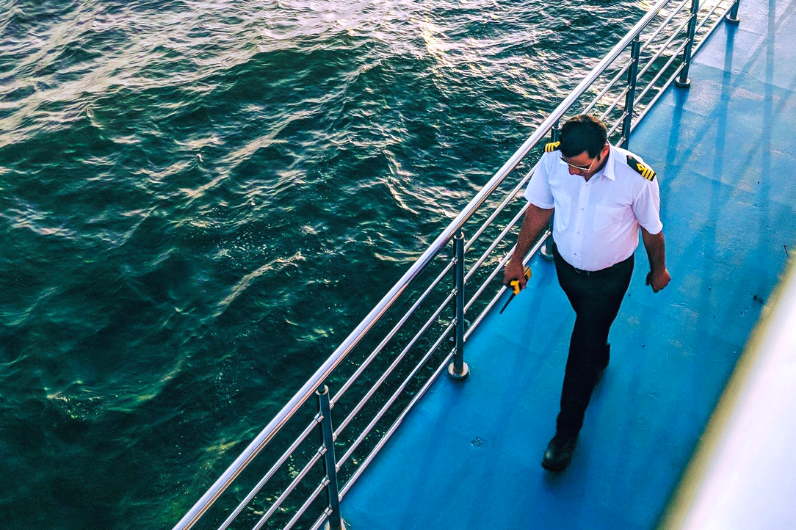
Which Tasks Does A Superyacht Captain Carry Out?
As Captain, specialising in commanding and managing luxury yachts over 24 metres in length, you’ll be responsible for a crew and the safety of passengers. As well as this, you answer to the yacht’s owner about the decisions you make. Effective communication and leadership are crucial. Will elaborates:
“The Captain is responsible for the safety of the vessel and crew/passengers. Building an effective culture and maintaining the highest standards of professionalism and safety whist complying to all regulatory requirements. Managing expectations of owners and other stakeholders such as management companies, is another key part of being a successful captain.”
The smaller the yacht, the more hands-on the Captain must be. Yet they will have hold more administrative duties if the yacht is larger.
How Long Does It Take?
Naturally, depending on the candidate, this will vary. However, Will remarks that “6+ years is realistic to gain the necessary experience, sea time, and modules.”
The Qualifications & Traits You Need
As Captain, you will need:
- Great communication skills (to deal with owners, contractors, crew, and guests alike)
- Personnel management skills
- Excellent seafaring knowledge
- An understanding of accounting
- IT and administration skills
The UKSA pathway for MCA Deck Office certification outlines a series of steps you can take:
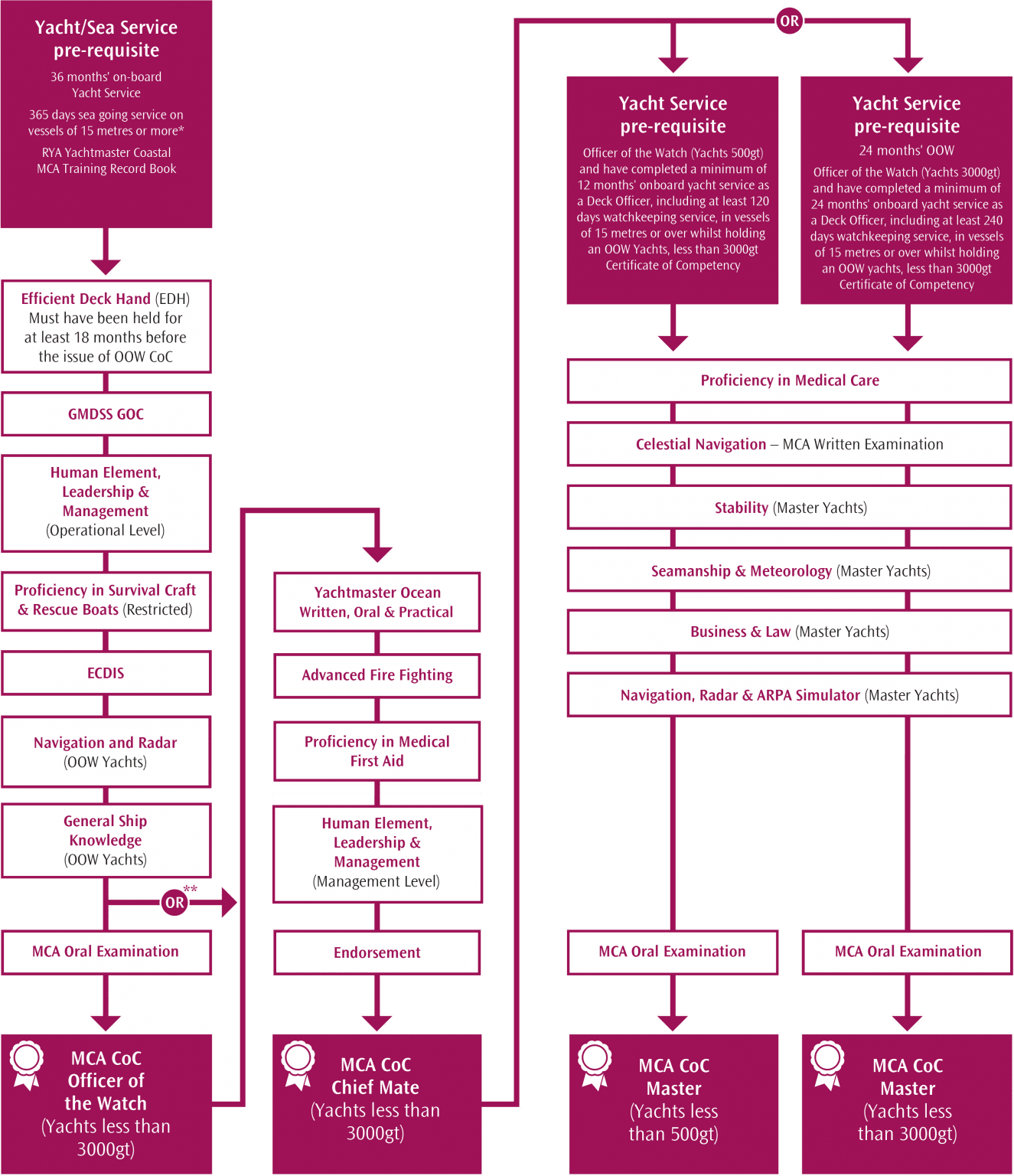
To keep up to date with the latest Superyacht Content News, click here .
Sign up to our Newsletter below:
Newsletter Signup
- Your Name First Last
- Your Email *

Maisie Granger
Related articles, big question for crew… so you want to be wealthy, the crew network – top jobs this week, galley crumbs: top 5 pre-retirement options for superyacht chefs, life after yachting: oceanform. from wearing uniform to designing them.

Popular Posts
- Yacht Photographer, Stuart Pearce Discusses Superyacht Photography With Us
- Winter Superyacht Escapes
- Tender Of The Week: Castoldi JT21 Available To Reserve Now!
- 10 Essential Superyacht Charter Toys To Entertain Guests
- 4 Mega Lürssen Superyachts Set To Launch In 2023
Superyacht Content
Social media influencer and digital brand expert.
Superyacht Content brings you the latest in social news for the superyacht industry.
Keep up to date with us across our social channels, and don’t forget to hit that share button!
- Superyacht News
- Superyacht Jobs
- Superyacht Marketing
Join our Newsletter
Copyright © 2023 Superyacht Content | Website Design by Zonkey
Privacy | Credits | Get in Touch

A Quick and Easy Guide to Superyacht Deck Careers
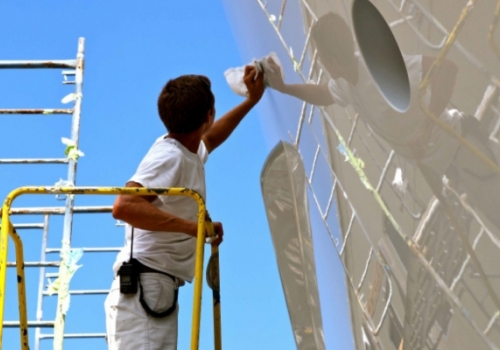
For those looking to enter the superyacht industry from the outside, a career on deck represents the ultimate escape from the drudgeries of a 9-to-5 office job, thanks to its winning combination of sunlight, fresh air, physical activity and travel.
From deckhand, to bosun, to chief officer, all the way up to superyacht captain, there are ample opportunities for progression within a fulfilling and unique career which can be lifelong if you play your cards right. But you might be wondering, how do you navigate the career ladder from scrubbing teak to steering a multi-million dollar vessel? Here, we present a quick and easy guide to deck careers, with some help from the recently-launched careers guidance platform, Academy by Ephemeris , whose comprehensive deck pathway clearly lays out the steps you need to climb in order to reach your goals. Indeed, as Alex Freeman, a former yacht chief officer with 16 years of ocean experience says: “If I was currently looking for my first deck position without any qualifications, Academy by Ephemeris would be the perfect platform to help me figure out exactly what I needed to do in order to get there.”
Deckhand: The day to day
As the entry point for a deck career, the deckhand’s primary responsibility is cleaning and maintaining the exterior of a yacht as a member of the deck team. Headed up by the bosun, the deck team assists in docking operations, drives the tenders, launches and stows toys, supervises guests’ watersports activities and supports the interior crew when needed.
Working as the most junior member of the deck team, there will inevitably be a lot of dirty work. In other words, be ready for a lot of cleaning and polishing when the owner and guests are not on board. Whether that is scrubbing teak, polishing stainless steel, or cleaning cushion covers, you will be tasked with keeping the boat looking its most beautiful at all times.
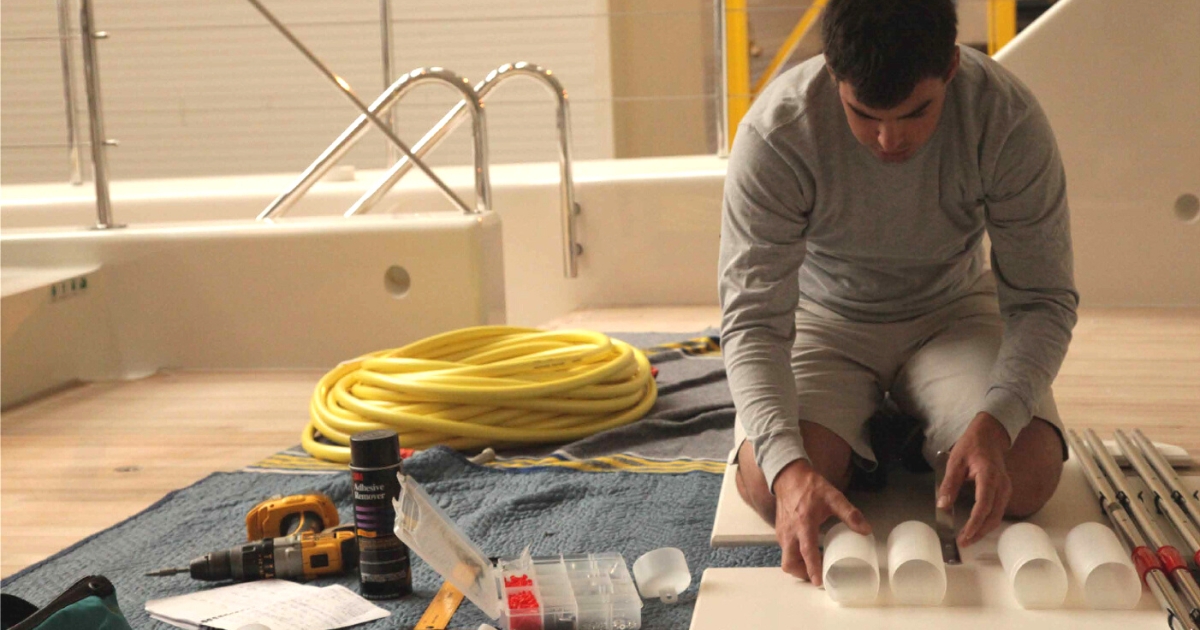
How do I become a deckhand? Qualifications and training
As outlined on the Academy by Ephemeris deck pathway, before you become a deckhand, or take on any crew position, you are required to have STCW Basic Safety Training and be able to produce a ENG1 medical certificate to ensure that you can evidence being both safe and medically fit enough to perform your role. Alongside these bare minimum requirements, there are also numerous additional qualifications you can consider working towards in order to help you scale the deck career ladder.
These include a National Powerboat Certificate, a VHF Radio Operator Course and a MCA Yacht Rating Certificate, with some larger motor yachts also requiring a certificate in Proficiency in Designated Security Duties (PDSD) for those who have security duties on ISPS-compliant yachts above 500GT (gross tonnage). For more information, visit the Academy by Ephemeris website.
Bosun: The day to day
If you’ve banked at least two years as a deckhand/lead deckhand and have natural leadership qualities, the next logical step is to apply for a bosun position. As the most senior member of the deck department, you will oversee and manage all on-deck operations, including docking and anchoring procedures, the maintenance of tenders, toys and other onboard equipment, and delegate tasks on a daily basis to more junior crew members. Reporting directly to either the first officer or the captain, the bosun serves as a vital link between the deck department and the bridge, helping to ensure that the day-to-day operations of the vessel run as safely and smoothly as possible.
The bosun is also in charge of safety on deck, meaning that it is vitally important that you are well versed in the yacht’s safety procedures and have all of the relevant qualifications in this area.
How do I become a bosun? Qualifications and training
Although there is no single prescriptive list of qualifications for a bosun position, alongside the STCW certificate, ENG1 Medical Certificate and PB2 or IYT Tender Driver License, generally you will also be required to hold an RYA Yachtmaster Offshore or IYT Master of Yachts <200GT as a bare minimum.
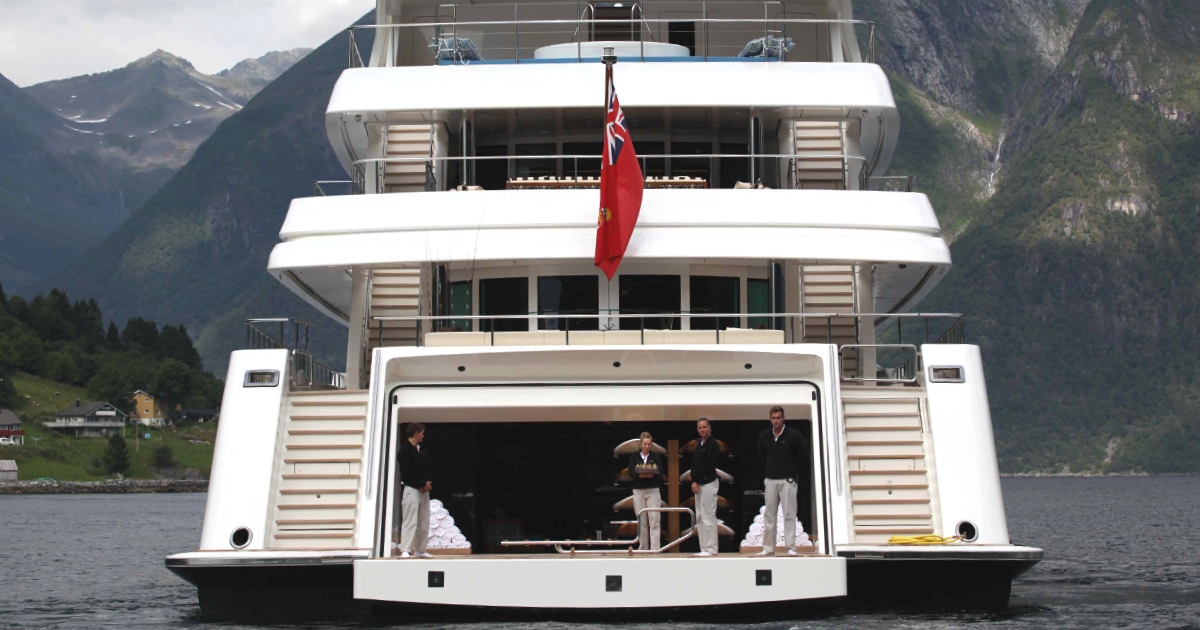
First/Chief Officer: The day to day
As the captain’s second in command, the first/chief officer has wide ranging responsibilities which will keep you constantly on your toes - in a good way! This includes overseeing all deck operations and maintenance, managing deck crew, watchkeeping, as well as performing various administrative duties. The first officer is also required to have up-to-date knowledge of all onboard safety procedures in case of an emergency, and must be able to step up to manage the bridge and navigation systems in the captain’s absence.
How do I become a First/Chief Officer? Qualifications and training
By the time you reach this level on the deck careers pathway, it is all about securing the relevant ‘Certificate of Competency.’ To qualify for a ‘Chief Mate Certificate of Competency’, you must either hold an OOW (Officer of the Watch) Yacht <3000 GT, II/1 Certificate of Competency or have completed all of the requirements for this qualification. In addition, you also need to be in possession of either an IYT Master of Yachts Unlimited or an RYA Yachtmaster Ocean, as well as fulfilling numerous other requirements, such as holding a valid Seafarers Medical Fitness Certificate. Since this role comes with a high level of people management, prospective chief officers should also ensure that they work on their interpersonal skills through courses such as the MCA approved ‘Human Element Leadership and Management Course’, so that they can evidence the ability to both effectively manage and lead crew.
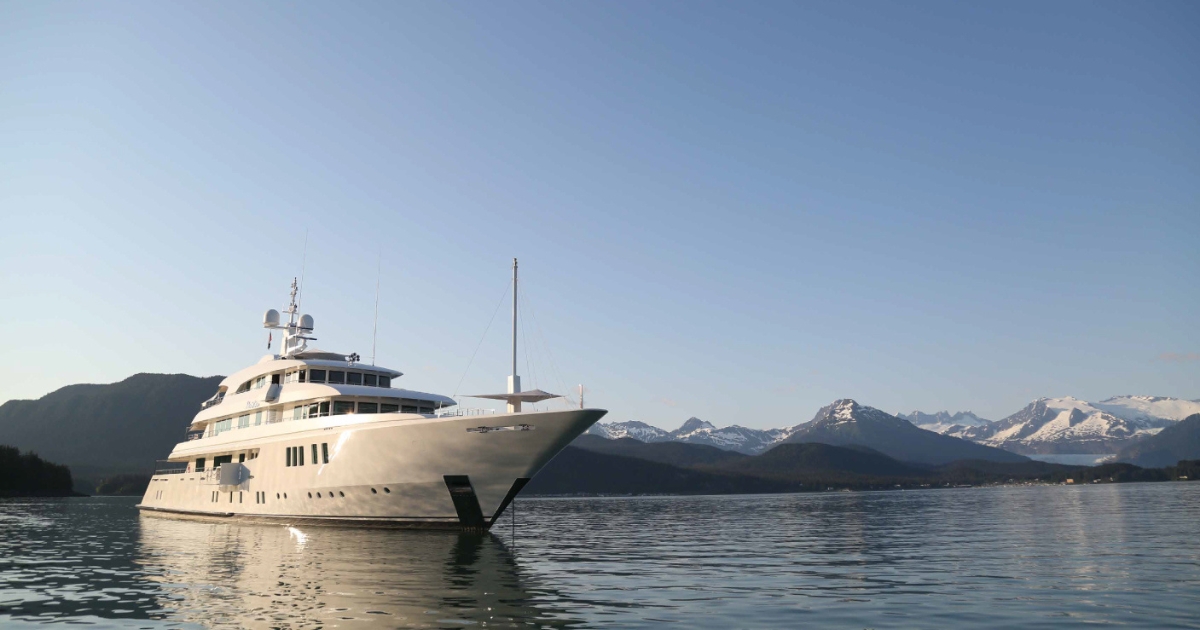
Captain: The day to day
Finally, after successfully scaling the deck careers pathway, we have reached the much revered role of superyacht captain. Alongside actually driving the boat, captains are often described as the ‘CEOs’ of a boat, as they are responsible for running every aspect of a vessel. Their broad-ranging list of daily tasks includes hiring and managing crew, controlling onboard costs, planning and executing voyages to suit the requirements of owners and charter guests, organising repairs and maintenance, ensuring that the boat adheres to all international, flag and port state regulations, maintaining the highest levels of safety and security on board - and the list goes on! Another way of looking at this position is that the captain is ‘chief problem solver’, on a yacht, tasked with ensuring that all onboard issues (whether crew-based, practical or logistical) are resolved as efficiently and smoothly as possible, so that the owner and their guests can enjoy the highest possible levels of service during their time at sea.
How do I become a Captain? Qualifications and training
As with the Chief Mate position, in order to secure a position as a superyacht captain you will need to have the relevant Certificate of Competency: in this case, the Master Yachts <500GT/<3000GT Certificate of Competency. Unsurprisingly, this has a highly thorough process to back it up, including a plethora of licenses which must be secured and a rigorous oral examination to truly put you through your paces. Furthermore, as you would expect from a position with so many facets to it, it takes far more than just having the relevant qualifications to secure your first appointment as a superyacht captain. Other important factors which are considered for a captain’s position include the amount of time spent on board yachts, geographical and yacht handling experience, people management skills, the degree of financial common sense and many more. Since you will be reporting either to the owner’s representative, or the owner themselves, each owner will require a captain to precisely fit their vessel size and itinerary, as well as their own personality, meaning that it is a myth that there is a certain ‘type’ of person suited to becoming a captain. Nevertheless, although qualifications alone won’t necessarily get you all the way to locking in your first captain’s role, being able to show evidence of additional or specialist courses such as ‘Advanced Training for Ships Operating in Polar Waters’ and ‘Helicopter Landing Officer Training’ can also help you make an impression on an owner and stand out from the crowd in what can be extremely tough and competitive interviews. To explore Academy by Ephemeris’ deck pathway for yourself, visit the company’s website here.

Post your comment
You cannot post comments until you have logged in.
No one has commented on this page yet.
RSS feed for comments on this page | RSS feed for all comments
Search articles with keywords

Do you operate a yacht? Our app is perfect for you
How to become a yacht captain - certifications & experience.
Just like any other highly paid and highly specialized position, becoming a yacht captain is a long grind. Nothing is given to you. You have to start from the bottom and work your way up. It is a process that takes many years of sea time, education, and experience.
Assuming that you are relatively new to the industry, it’s best to start from the very beginning. In the following chapters we will go through a detailed breakdown of the certifications and qualifications you need, and show you how to become a yacht captain.
Table of contents
How to become a yacht captain - Basic education
Rya certification, creating your resume, get to a yachting capital.
- "Earning" your first job
- Get experience & continue your education
Climbing the ranks
Becoming a yacht captain, responsibilities of a yacht captain, yacht captain salary, final notes on how to become a yacht captain.
.jpeg)
Before you get your first job onboard of any yacht, there are a few courses you need to take. These are mandatory for everyone who wishes to work onboard, and are commonly known as basic training for seaman:
- STCW 2010 Basic Safety Training (BST) - This training consists of first-aid practices, response to emergencies, personal safety, social responsibility, and best practices for sea survival. The duration of this course is 5 days and pricing starts at $1012.
- Efficient Deck Hand (EDH) course) - This course teaches basic seamanship, rope and wirework, painting and maintenance routines, as well as other safe working practices aboard. Much like the BST, this course is 5 days long and pricing starts at $964).
At this point, what you want to do is get your Royal Yachting Association (RYA) certificate. The Royal Yachting Association (RYA) is a recognized organization that issues your Powerboat Handling Level 2 (basic course), Yachtmaster™ Offshore , and Yachtmaster™ Ocean .
Note that the costs associated with the RYA certificate can vary, as you need to find an associated training center, purchase all the necessary materials, and abide by all the entry requirements. So you might need to do some research at this point.
Once you successfully complete the courses mentioned above, you will need to put your CV together. There are many templates you can use for this purpose. You can start by using this one .
Once your CV is created, you will need to seek out the best yacht crew agencies and start applying to all of them. This page gives a good overview of the most popular options.
Keep in mind that there are many options when it comes to resume templates and yacht crew agencies. It might be a good idea to use Google to find more options.
.jpeg)
To increase your odds of getting a job onboard, you will now need to get to one of the yachting capitals. This is, by far, one of the best tips for ambitious young sailors that want to know how to become a yacht captain.
Don’t get fooled by those who tell you of their single best yachting capital of the world. Depending on your current location and budget, you will have several options. Check this article to start your research.
“Earning” your first job
As soon as you arrive at your yachting capital of preference, you will need to get a job. Similar to any other industry, this usually happens by actively seeking out open positions. For yachting work, this is done through “dock walking”, a term that refers to the process of going from boat to boat, searching for opportunities.
What you want to do here is be pleasant, hand out your CV, grow your network, and offering any kind of service. There might be owners that need help with buffing, sanding, polishing, scrubbing decks… you name it! Take any job that you can because each hour you spend onboard improves your resume.
After a while, you will hopefully manage to get a job aboard a (super)yacht. This is where you want to be. It is important to manage your expectations and prepare to work very hard. Your first job will not be glamorous and it will certainly not be a “working holiday”. You will be living in a cramped scape, away from home, doing chores most hours of the day.
Don’t let the day-to-day tasks discourage you. Everything you do at this point helps you build character and shows that your position is “earned”. You will have many opportunities to gain experience, overdeliver, and start climbing the ladder.
Gain experience & continue your education
As you become more experienced and collect enough hours onboard, you will qualify for a few more courses, which are issued by the Maritime and Coastguard Agency (MCA).
- Officer Of the Watch (OOW) - This course allows you to become an officer on board a vessel up to 3000gt. In order to apply for this course, you will need to meet several requirements, including >250 days onboard, holding an RYA certificate for at least 36 months, and having completed an MCA training record book . The latest is a list of tasks that you need to complete while serving onboard a vessel that exceeds 15 meters in length. Anything smaller is not qualified as valid experience according to the MCA. The modules of OOW include:
- General Ship Knowledge (GSK) - Price between $1000 - $1100
- Navigation & Radar (ARPA operation) - Price upon request
- Global communications training (GMDSS GOC) - Price starting at $1625
- HELM Training Operational Level - Price upon request
- Proficiency in survival cross & rescue boats - Price between $860 - $900
- Electronic Chart Display Information System (ECDIS) Training - Price between $1300 - $1800
Each of the modules, once completed, requires a written exam. This means that you need to find a partner organization where you can go and write the exam. If you pass, the certificate will be sent to your location (including a digital copy that you can add to your resume).
You need to pass all of the modules in order for the MCA to issue your certificate of competence (COC). And as soon as all that is done, you are officially qualified to perform your oral exam for the OOW. Here is a video that shows you the steps you need to follow:
The exam itself consists of a discussion with a qualified instructor, where you go through all the modules through a series of questions. Upon passing the exam, and given that you hold all the aforementioned certificates, you will receive the MCA Yachts OOW certificate and are officially qualified to be a deck officer.
Keep in mind that the certificate itself doesn’t automatically guarantee you a promotion. You might move slightly up the ranks (lead deckhand) but you will still need to gain more experience in the form of additional sea time.
More specifically, you can continue with higher-level education once you gain even more experience on board.
The course you want to do is known as MCA Master 500 yachts . You can do this once your certificate of competence has been issued for OOW and 12 months have passed. You will also need to have an additional 120 days of verified sea service.
The course consists of several master modules, which include:
- Ship Stability - Price: $1500
- Business and Law - Price: $1500
- Navigation, ARPA, and radar simulator - Price: $3350
- Seamanship & Meteorology - Price: $1500
The course also includes some ancillary course modules, as well as the requirements you need to abide by in further detail. Similar to the OOW, you will need to pass a written certificate for each of the modules, in order to proceed to an oral exam to receive your Master 500 certificate of competence (COC).
You now have all the necessary qualifications - there are no more modules. However, you still need to perform an additional 12 months of sea time, and 120 days of sea service.
The final step is getting your MCA Master 3000 certification, a process that consists of an oral exam only. You can find more information about the requirements and components here . The oral prep course for this exam is highly recommended, takes 5 days, and costs between $890 and $1160, depending on the number of students that choose to participate.
Those who have little to no experience tend to think that a captain’s only responsibility is to command the ship. The truth is much “broader”. A yacht captain’s responsibilities are divided into three areas:
- To ensure the safety of life of everyone onboard
- To ensure the safety of the vessel (paperwork, unforeseen circumstances, etc.)
- To ensure the safety of the marine environment
This may sound rather simple, but remember that there are many subcategories that fall under these responsibilities:
- Ensuring the crew is well-trained, rested, and qualified to do their job, all while remaining safe. This requires strong (cross-cultural) people skills and is probably the hardest part of the job.
- Make sure that all your personal certificates, as well as the vessel documentation, is in order.
- Staying up to date with yacht inspection, maintenance, and logging all the necessary information. You can completely automate this responsibility by using our software, PlanM8 .
- Make sure that the vessel is compliant with the International Safety Management code
- Navigation of the vessel
- Make sure the yacht owner (or guests) are satisfied.
The salary of a yacht captain depends on several factors, including the years of experience, the size of the vessel, and the duration of the contract. Generally speaking, the low end of the salary is approximately $5000 per month and the high end exceeds $18.000 per month. For more information, check this resource .
After reading all of the above you should have a better idea of how to become a yacht captain. There are many courses you need to complete and lots of personal sacrifice in the form of sea time. This is why only the most passionate ones - those willing to go the extra mile - will manage to get a hold of the helm.
Remember that in between each of your certifications it is important to get as much sea time as possible, doing everything in your power to learn from the master on board. Much like any traineeship, your primary concern should involve gaining lots of experience.
The discipline and character you build along your former years will help you understand the importance of continuous education. You will naturally want to familiarize yourself with the latest industry practices and improving your abilities.

- Brokerage New Construction How to Buy How to Sell
- Yacht Fleet Yacht Catalog Charter Marketing Destination Guides
- Financial Services Payroll & Accounting Payroll Service Process Logistical Support Admin Services Crew Admin
- Job Descriptions Crew FAQ
- About Sitemap
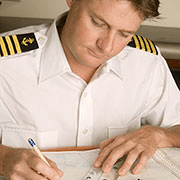
- Yacht Department Directory
- Deck Department
About the Captain
The captain onboard a yacht has a record of longevity, excellent owner references and strong crew management skills. This individual should possess working knowledge of yacht management and safety in addition to financial administration. The captain will excel in planning and communicating various itineraries to the owners and guests onboard in various cruising areas. All their certifications and licenses are fully up-to-date and they are familiar with the latest requirements/newest technologies. This role usually requires at least five years of experience on yachts.
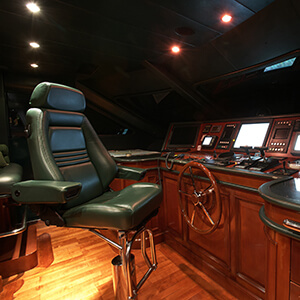
Job Responsibilities
- Ultimate safety for passengers, crew, environment and vessel
- Achieving owner's objectives
- Crew hiring and dismissal
- Personnel management
- Shipyard/project management
- Legal and regulatory compliance
Required Skills
- Calm and charismatic personality
- Superior leadership, communication, management and diplomacy skills
- Excellent boat handling and navigational skills
- Excellent ISM and ISPS knowledge and practices
- Excellent maintenance, engineering and technical / troubleshooting experience
- Ability to remain calm and give directions in an emergency situation
- Organized and methodical
- Financial management
Salary Modifiers
- Speaks multiple languages fluently
- New build experience
- Project Management certification or Management degree
- Limited experience in intended cruising area
- Lack of experience on a similar size vessel
Position Statistics
Career path, senior master, junior captain, first officer / chief mate, officer of the watch, junior deckhand.

How to Become a Yacht Captain- An Expert’s Handbook
Do you want to become a yacht captain? Having watched my husband climb the ranks over the past 12 years, I have first-hand experience of seeing what it takes to become a yacht captain.
We started working on a small catamaran in the Seychelles, and today, he is the successful Captain of a world-traveling 50m super yacht.
Becoming a yacht Captain requires a significant investment of time and money, but the reward of commanding your own vessel and crew is immeasurable.
Let’s explore what it takes, including the salaries, necessary skills, and certifications.
Table of Contents
Job Description of a Yacht Captain
The Captain of a superyacht is responsible for the safe navigation of the vessel, the safety of the crew onboard, as well as protecting the environment.
They are the primary source of communication with the yacht owner, guests, and management company.
They also handle all the daily operations of the yacht, including crew management and safety training. The Captain deals directly with management companies, port control, maritime legislation, budgets, accounting, and human resources.

Yacht Captain Salary
The below super yacht Captain salary guideline is based on my personal research using an average of over 10 major yachting platforms:
- 20m-30m: $4000-$7500 p/m
- 30m-40m: $5500-$9500 p/m
- 40m-50m: $8000-$15000 p/m
- 50m-70m: $13000-$19000 p/m
- 70m+: $16500+ p/m
Additionally, with longevity a yacht Captain can also expect to see discretionary annual raises and bonuses.
If they work on a Charter Yacht there will also be charter tips received averaging $2500-$5000 per week of chartering.

Roles and Responsibilities of a Yacht Captain
The job of a Yacht Captain can be compared to that of a CEO, CFO, and COO of a large corporation. The responsibilities are huge.
On a smaller vessel of 35m or less, the captain will need to be more hands-on, and they will likely also be the engineer of the vessel.
However, as the vessel size increases, you will have larger teams and heads of departments to assist in delegating tasks.
Roles and Responsibilities
- Crew Management and training
- Hiring and dismissals of crew
- Human resources
- Accounting and budgeting
- Safe navigation of the vessel
- Safe navigational planning
- Marine and environmental protection
- Vessel maintenance – planning yard work and refits
- Owner and guest liaison
- Planning of guest trips and itineraries
- Ensuring the yacht is compliant with maritime law
- Ensuring the yacht is compliant with all flag state safety regulations
Soft and Hard Skills
When it comes to the question of how to become a yacht captain, besides the required licenses, it is essential to hold certain soft and hard skills:
- Strong leadership skills
- Team management
- A quick thinker and problem solver
- Calm under pressure
- Exceptional communication skills
- Diplomatic in decision-making
- Excellent boat handling skills
- Navigational skills
- Administrative skills
- Organizational skills
- Computer literate
- Strong understanding of maritime legislation

Mandatory Certifications for How to Become Yacht Captain
The license required when identifying how to become a Yacht Captain is dependent on the size/tonnage of the vessel they wish to drive.
Your entry-level Captain license is the Yacht-Master 200 ton. This allows you to drive a vessel of under 200 tons, which is approximately 35m/100ft.
From there, with enough sea time and experience, you can move up towards the Master 500 and then Master 3000 tickets.
If you were to start from scratch, you would first want to look at how to become a deckhand . This will give you all the information and guidance you require before you get to the point when you are ready to start your master’s licenses.
Here is the order in which you would complete your courses:
- ENG1 Medical
- Efficient Deckhand (EDH)
- Yacht-Master Offshore (200ton)
- Yacht-Master Ocean (200 ton)
- OOW (Officer of the Watch)
- Chief Mate 3000
- Master 500 ton
- Master 3000 ton
Yacht Master Offshore 200 ton Limited
Holders of this certificate can Captain a yacht up to 200 gross tons and must be within 150 nm from a safe haven whilst doing so. This course is also required to legally stand watch on a vessel of up to 500gt.
The course consists of theory and practical work and takes 13 days to complete.
Pre-requisites for Yacht Master 200t Limited:
- 3,000 nautical miles while cruising at sea
- 50 days at sea as an active crew member
- 5 days as skipper on vessels less than 24m LOA
- 48 hours on watch at night underway as an active member of a yacht’s crew. During at least six hours of this nighttime experience, the candidate must have acted as the vessel’s captain or watch leader.
- A GMDSS-compliant Marine Radio Operator’s Certificate such as the RYA Short Range Certificate or higher
- All qualifying sea time must be within 10 years prior to the exam

Master of Yachts 200 ton Ocean Unlimited
This certificate allows the holder to be in charge of a commercial yacht of up to 200 gross tons on unlimited voyages.
This comprehensive six-day course on celestial navigation is designed to equip future yacht Captains with the knowledge necessary to navigate the globe using a sextant and air navigation tables.
Additionally, it will enable them to plan, undertake, and manage an ocean passage with confidence.
Pre-requisites for the Master 200 ton Unlimited:
- Before enrolling in the course, candidates must have completed two voyages of 250 miles each or one voyage of 500 miles. The majority of the journey must take place out of sight of land, which means being at least 20 miles away from the shoreline.
- For the qualifying voyage, it is expected to create a passage plan that can be reviewed during the course.
Officer of the Watch (OOW)
In order to obtain the MCA Officer of the Watch (Yachts Less Than 3000 GT) Certificate of Competency, candidates must complete seven distinct modules. These modules are designed to prepare candidates for the MCA oral exam.
Pre-requisites for the OOW:
- IYT Master of Yachts Limited certificate
- A minimum of 250 days of actual sea service
- 115 days can be either sea service, stand-by-service or yard service
- A Completed MCA approved training record book
The 7 modules include:
- Navigation and Radar (15 days)
- General Ships Knowledge GSK (5 days)
- Proficiency in Survival Crafts and Rescue Boats/Advanced Sea Survival (3 days)
- Human Elements and Leadership Management HELM (3 days)
- Global Maritime Distress and Safety Systems (GMDSS)
- Efficient Deckhand EDH (5 days)
- Electronic Chart Display and Information ECDIS (5 days)
- MCA OOW Deck Oral Prep Work (12 days)

Chief Mate 3000GT
After obtaining the Officer of the Watch certification for yachts less than 3000gt, you can apply to the MCA for the endorsement of the Chief Mate (Yachts less than 3000gt) Certificate of Competency. It is possible to apply for both certifications at the same time.
Course Modules include:
- STCW Advanced Fire Fighting (4 days)
- Proficiency in Medical First Aid (4 days)
- Human Elements of Leadership Management – Management level (4 days)
Master of Yachts (500GT)
This certificate is required in order to Captain a yacht of up to 500 gross tons.
Requirements for the course:
- 12 months as a watch-keeping officer with an OOW Certificate
- A valid ENG1
Modules include:
- Stability (5 days)
- Business and Law (5 days)
- Navigation and Radar with ARPA Simulator (10 days)
- Seamanship and Meteorology (5 days)
- Celestial Navigation Refresher and Exam (5 days)
- Proficiency for persons in charge of medical care onboard a ship (4 days)
Master of Yachts (3000GT)
This certificate is required in order to Captain a yacht of up to 3000 gross tons.
The modules for the Master 3000GT are the same as that of the Master 500. If you pass all the modules and have met the requirements for the Master 3000GT, you can skip the Master 500gt Course and do the exam and oral for the Master 3000GT.
Requirements include:
- including not less than 240 days watch-keeping service whilst holding an accepted OOW Certificate of Competency (CoC).
- All of this service must be completed in vessels of 15m or over in load line length and include 12 months in vessels of 24 m or over in load line length, or 6 months in vessels of 500gt or more.
- A valid ENG1 Certificate
Final thoughts
Most crew don’t anticipate the significant amount of time and money it takes when wondering how to become a yacht Captain.
My advice to you is to start logging your sea time from the very beginning and plan ahead. You don’t want to miss out on opportunities due to not having the required license.
If you are still looking for more detailed information or if you are looking to book a course, head over to the PYT website. They are an MCA compliant training facility with schools in Fort Lauderdale and South Africa.
Good luck on your journey. I hope to see you out in the big blue ocean commanding your own vessel one day.

Hi, my name is Lisa, a Chief Stewardess in the yachting industry with 10 years of experience, as well as 8 years of hospitality experience prior to that. Being in the yachting industry has been a whirlwind of adventure, growth, challenges and some of the best experiences of my life, and I am excited to share my knowledge and experiences with all of you.

Superyacht training and certification
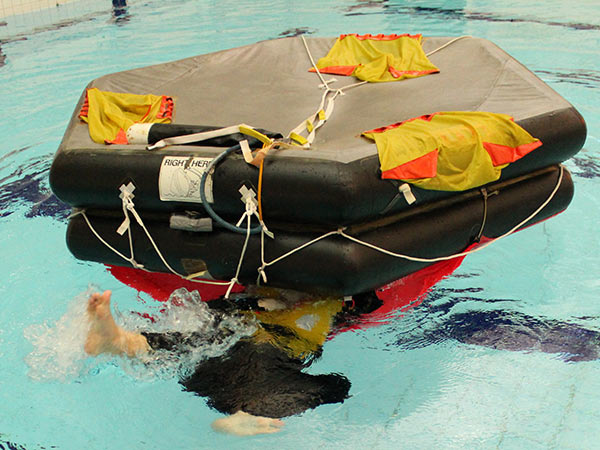
Read on to learn about the key areas of superyacht training and certification that you might need to consider and click on the button below to access Superyacht UK\’s members that specialise in superyacht training and recruitment.
Note you should include on your CV full details of what you have achieved and an outline of what skills you have learnt (for example a brief syllabus). This will help potential employers to understand exactly what training you have received, even if they are not personally familiar with every course.
MCA certification
MCA stands for the Maritime and Coastguard Agency. It is the organisation responsible for maritime safety in the UK. This role encompasses setting the standard for training and certification for seafarers, including the minimum requirements for certification of superyacht crew. The MCA is an agency of the Department for Transport of the British Government.
Even if you have completed similar courses, unless they are approved by the MCA they will not be recognised for use in the superyacht industry.
Courses include:
- MCA STCW Basic Safety Training Certificates
- MCA Yacht Rating Certificate
- MCA Deck Officer Certificates (Officer of the Watch (OOW), Chief Mate and Master)
- MCA Engineering Officer Certificates (Chief Engineer)
If you have any previous maritime experience, or wish to talk to someone in more detail about which level of certification is right for you, please contact the MCA directly on 023 8032 9231. Or visit the MCA site for further information.
RYA Qualifications
RYA stands for the Royal Yachting Association, which is the UK’s national association for all forms of recreational and competitive boating. RYA’s training schemes for powered and sailing craft provide qualifications for skippers, instructors and water sports professionals worldwide.
RYA Yachtmaster and Yachtmaster Ocean
The RYA Yachtmaster Offshore Certificate of Competence is gained by taking an exam in either a sailing or motor yacht – your certificate will be endorsed accordingly. There is no formal training course leading up to the exam, but those who have not previously taken RYA courses often find it useful to book themselves in for some informal training prior to taking an exam. You will need to get your Certificate commercially endorsed for it to be valid for working on board superyachts.
The Yachtmaster Ocean exam is an oral and written test of your knowledge of ocean passage making including planning, navigation, worldwide meteorology, crew management, yacht preparation, maintenance and repairs. You will also be questioned on your sights taken at sea during an ocean passage. Again, you will need to get your Certificate commercially endorsed.
IYT (International Yacht Training) is a US-based organisation and its equivalent courses are also recognised by the MCA.
Find more information about RYA training and certification
Degrees and Foundation Degrees
A Foundation Degree has been developed for the Superyacht sector. Known as the FdSc Operational Yacht Science, it is usually delivered over a period of three years in conjunction with other training or a ‘cadetship’. Some training providers are now offering a full programme of training to provide you with a broad overview of all superyacht operations including deck duties, engineering and hotel services, and a ‘fast-track’ route to Deck Officer OOW certification.
There is often the opportunity to ‘upgrade’ your Foundation Degree to a full degree with further study to achieve a BSc (Hons) Marine Studies (Ocean Yachting), for example.
There are benefits with both the foundation degree route, and the more traditional on-the-job certification route and you should consider these carefully before making your decision. Find out as much information as you can about your chosen route before embarking on it.
Stewarding and Hospitality
Marine and non-marine training providers offer training courses for stewarding and catering skills such as:
- Silver service
- Wine appreciation
- Table management
- Bar management
Courses also exist covering an overview of all of these types of skills, sometimes including certifications such as STCW Basic Safety Training or RYA qualifications.
How to Become a Yacht Captain? Step-By-Step Guide
Setting sail on the high seas as a yacht captain is a dream that captivates the hearts of many. The allure of commanding a vessel, exploring breathtaking destinations, and living a life intertwined with the ocean’s vastness is undeniably enticing. However, this coveted role comes with great responsibility and requires a unique set of skills and qualifications.
In this article, we embark on a journey to unravel the path of becoming a yacht captain. We will delve into the responsibilities that come with this esteemed position and the skills needed to excel in the role. From mastering navigation and seamanship to leading a crew and ensuring the safety of all on board, the role of a yacht captain demands a comprehensive understanding of both the art and science of sailing.
While the journey to becoming a yacht captain may be challenging, it is a rewarding pursuit for those who possess a deep love for the sea and a desire for adventure. Whether you aspire to captain luxury superyachts or explore remote corners of the world on expedition vessels, this article will serve as a compass, guiding you through the necessary steps and providing insights into the world of yacht captains.
So, hoist the sails, secure the lines, and join us on this voyage as we explore the path to becoming a yacht captain and the exciting possibilities that await those who choose to navigate the oceans as masters of their own destiny.
Understand the Role of a Yacht Captain:
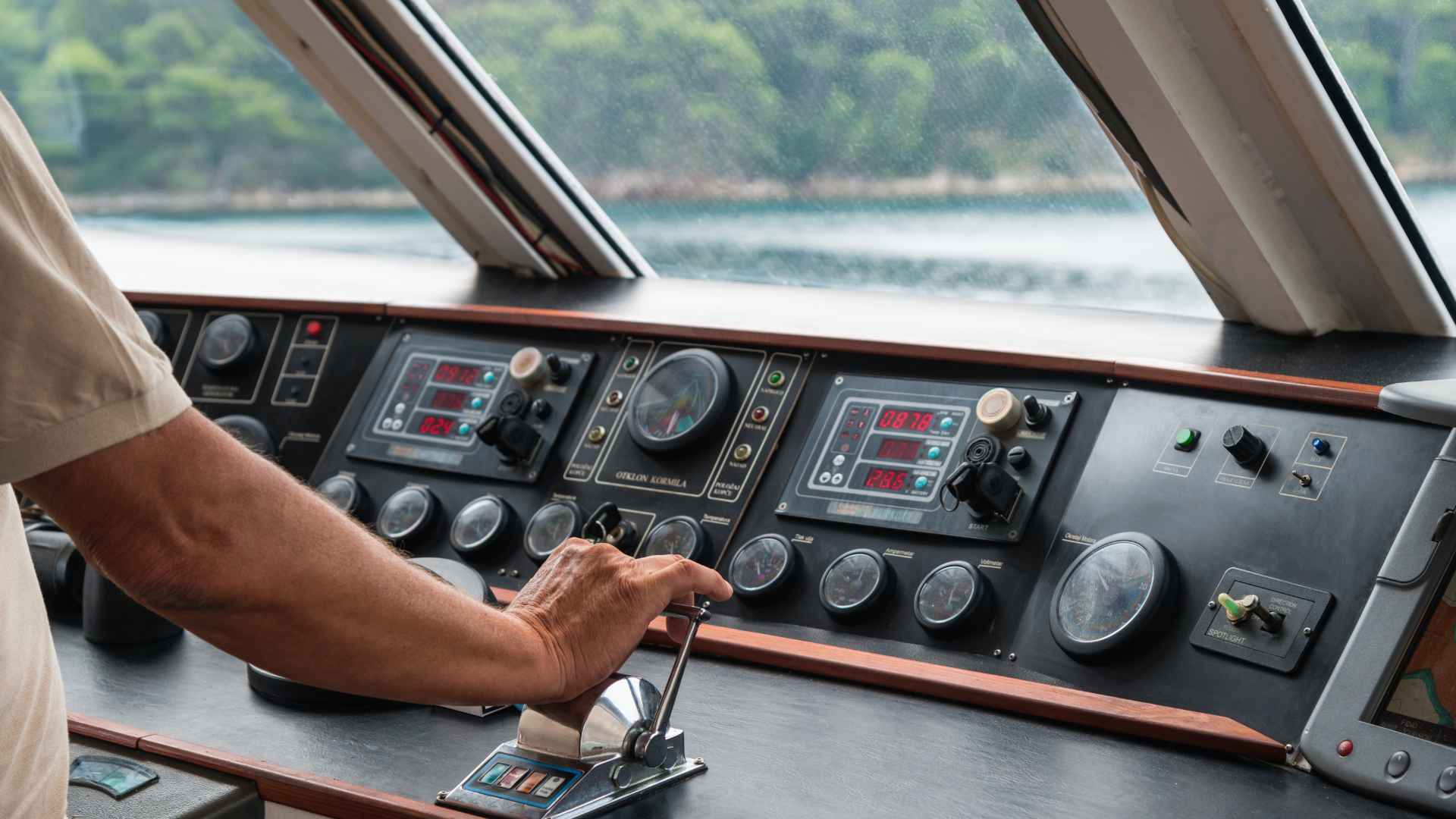
What are the primary responsibilities of a yacht captain?
The primary responsibilities of a yacht captain involve the overall operation and management of a yacht. Here are some key areas of responsibility:
- Vessel Navigation: The captain is responsible for safely navigating the yacht, ensuring it follows maritime regulations and adheres to navigation rules. This includes charting courses, monitoring weather conditions, and operating navigation equipment.
- Crew Management: The captain oversees the crew and is responsible for their training, supervision, and performance. They assign duties and delegate responsibilities to ensure smooth operations on board. Effective crew management involves fostering teamwork, promoting a positive work environment, and addressing any issues that may arise.
- Guest Safety: The safety of passengers and guests is a top priority for a yacht captain. They ensure that all safety protocols and procedures are in place and followed diligently. This includes conducting safety briefings, maintaining emergency equipment, and implementing appropriate security measures.
- Maintenance Oversight: The captain is responsible for the overall maintenance and upkeep of the yacht. They oversee routine maintenance tasks, coordinate repairs and inspections, and ensure that the vessel meets all safety and regulatory requirements. This includes managing budgets, inventory, and working closely with engineers and technical staff.
Effective Communication, Leadership, and Problem-Solving Skills:
Being a yacht captain requires strong communication, leadership, and problem-solving skills due to the nature of the role:
- Communication: The captain must effectively communicate with the crew, guests, and other stakeholders. Clear communication ensures smooth operations, fosters teamwork, and promotes safety on board.
- Leadership: A captain is expected to lead by example, inspire the crew, and make informed decisions in high-pressure situations. They must possess strong leadership skills to guide the team and manage various challenges that may arise.
- Problem-Solving: Yacht captains often face unexpected situations or emergencies. They need to think critically, make quick decisions, and find solutions to ensure the safety of everyone on board. Problem-solving skills are crucial for handling unforeseen circumstances effectively.
Necessary licenses and certifications required to become a yacht captain
To become a yacht captain, individuals must acquire the necessary licenses and certifications. The specific requirements may vary depending on the country and the type of vessel. Here is a general overview:
- OUPV (Operator of Uninspected Passenger Vessels) License: This license, also known as a six-pack license, is required for operating uninspected vessels carrying up to six paying passengers. It allows captains to operate charter boats, fishing boats, and small passenger vessels.
- Master License: The Master License allows captains to operate larger vessels that carry more passengers. There are different levels of Master licenses, such as Master 25, 50, 100, 200, and 500. The number denotes the maximum gross tonnage of the vessel.
Eligibility criteria for these licenses typically include:
Meeting the minimum age requirement (usually 18 years or older).
- Accumulating a specific number of sea service days, which may vary based on the license level.
- Passing a written examination that tests knowledge of navigation, safety, and other relevant topics.
- Meeting medical fitness requirements.
- Providing character references and completing an application process.
It’s important to note that these requirements can vary between countries and regions. It’s recommended to consult the maritime authority or governing body in the relevant jurisdiction to get accurate and up-to-date information on licensing and certification requirements for yacht captains.
Gain Experience and Build a Skill Set:
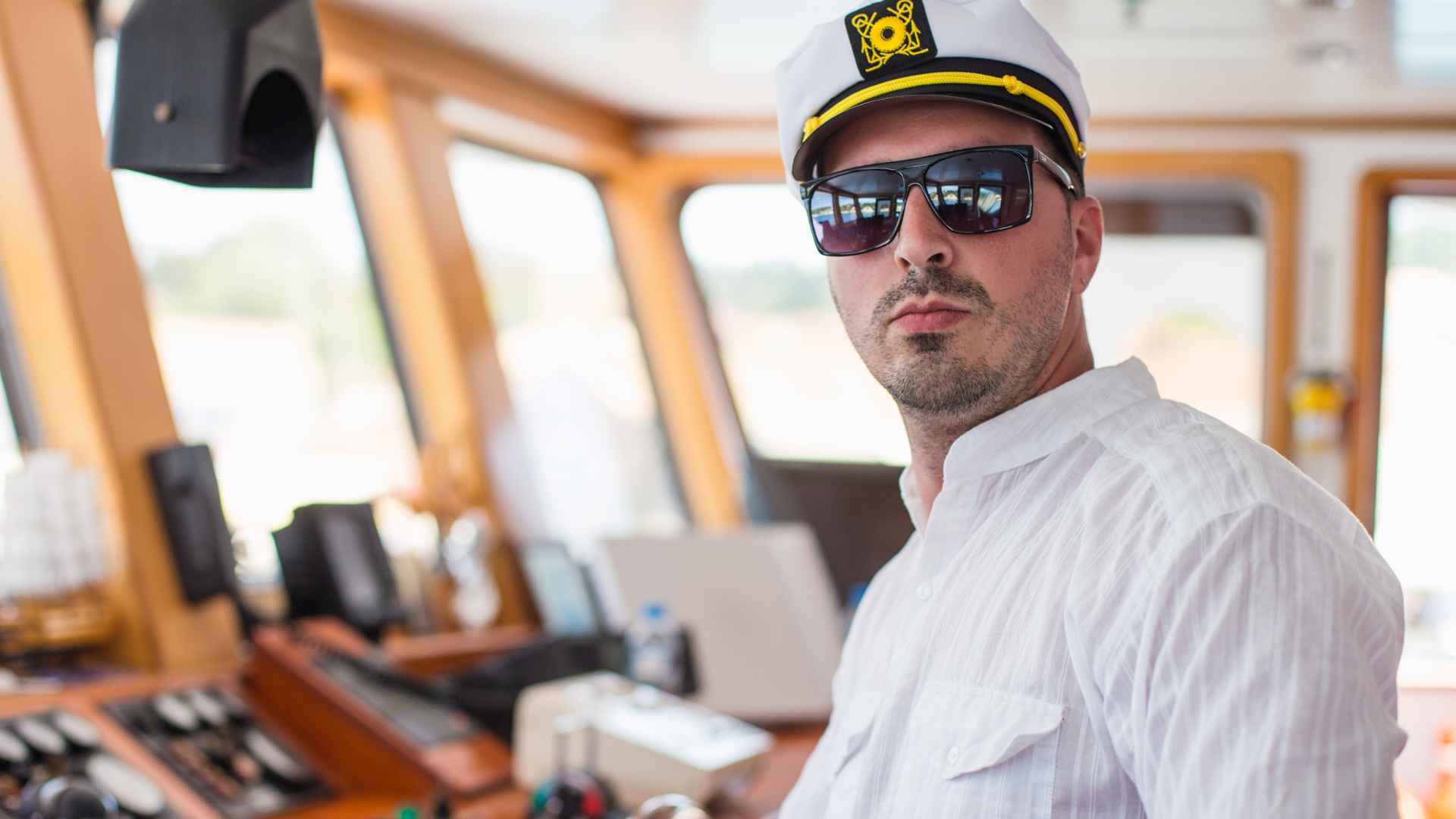
Importance of gaining foundational boating knowledge
Gaining foundational boating knowledge is essential for aspiring yacht captains. It provides a solid understanding of boating principles and sets the groundwork for further development. Here are some key points to consider:
- Understanding Navigation Rules: Familiarize yourself with the rules of navigation, including buoyage systems, right of way, and international maritime regulations. This knowledge ensures safe navigation and promotes responsible boating practices.
- Weather Patterns and Conditions: Learn about weather patterns, tides, and their impact on boating. Understanding weather forecasts and how to interpret them is crucial for planning safe voyages and avoiding hazardous conditions.
- Basic Boat Handling: Acquire basic boat handling skills, including steering, docking, and maneuvering in different environments. This knowledge forms the foundation for operating and controlling a vessel effectively.
There are various resources and courses available to help gain this knowledge. Consider taking boating safety courses offered by organizations such as the United States Power Squadrons (USPS), the U.S. Coast Guard Auxiliary, or local boating associations. Additionally, introductory sailing lessons or basic boating courses can provide valuable insights into navigation and boat handling.
Value of gaining hands-on experience by working as a deckhand or crew member on a yacht
Gaining hands-on experience by working as a deckhand or crew member on a yacht is invaluable for aspiring yacht captains. This experience provides insights into yacht operations, teamwork, and the daily responsibilities involved. Here are a few benefits:
- Exposure to Yacht Operations: Working on a yacht allows you to observe and participate in various tasks related to vessel maintenance, navigation, safety protocols, and guest services. You’ll gain practical knowledge and understand the dynamics of running a yacht.
- Teamwork and Communication Skills: Collaborating with other crew members fosters teamwork and effective communication. Learning to work efficiently as part of a team is crucial for a yacht captain, as they need to lead and coordinate the crew effectively.
- Networking Opportunities: Building connections within the yachting industry can lead to future job opportunities and career advancement. Engage with experienced professionals and seek mentorship to enhance your learning and growth.
Benefits of enrolling in professional training programs and maritime academies
Enrolling in professional training programs and maritime academies can significantly enhance your knowledge and credibility as a yacht captain. Here are a few options to consider:
- STCW (Standards of Training, Certification, and Watchkeeping) : The STCW training is an internationally recognized set of standards that provide essential safety and operational training for seafarers. This certification covers areas such as firefighting, personal survival techniques, first aid, and maritime security.
- RYA (Royal Yachting Association) Qualifications: The RYA offers a range of qualifications that are widely recognized in the yachting industry. These certifications cover areas such as navigation, radar operation, diesel engine maintenance, and yachtmaster training.
- Maritime Academies: Consider attending a maritime academy that offers specialized training for yacht captains. These institutions provide comprehensive education and practical experience, preparing you for various challenges of the role.
Investing in professional training demonstrates your commitment to the industry and enhances your skill set, making you a more competitive candidate for yacht captain positions.
Remember, gaining experience and building a skill set takes time and dedication. Embrace opportunities to learn, be proactive in seeking hands-on experience, and continually update your knowledge through courses and certifications.
Obtain the Required Licenses and Certifications:
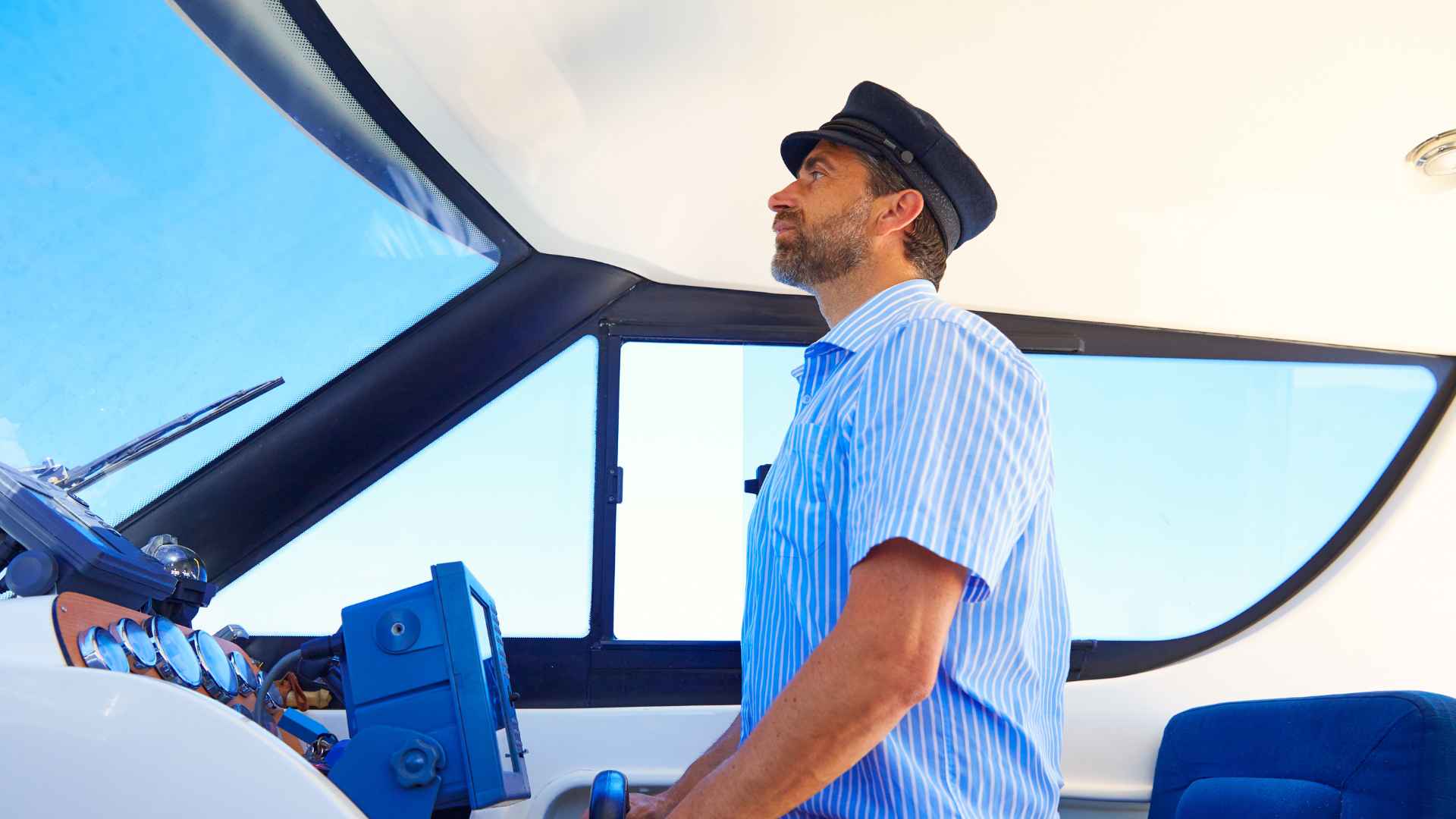
Familiarize yourself with licensing authorities:
To obtain the necessary licenses and certifications as a yacht captain, it’s important to familiarize yourself with the licensing authorities and organizations that oversee the process. The specific authorities may vary depending on the country or region. Here are a couple of examples:
- US Coast Guard: In the United States, the US Coast Guard is responsible for issuing licenses and certifications for yacht captains. They have different licensing levels, including OUPV (Operator of Uninspected Passenger Vessels) and Master licenses.
- Maritime and Coastguard Agency (MCA): The MCA is the licensing authority in the United Kingdom and is recognized internationally. They offer a range of certifications, including the Officer of the Watch (Yacht <3000 GT) and Master (Yachts) certificates.
Each licensing authority has specific requirements and application processes. It’s important to thoroughly research and understand the guidelines and regulations set forth by the respective authority in your jurisdiction.
Complete the required sea time and training:
Accruing the necessary sea time and training is a crucial step in obtaining your yacht captain licenses. The requirements may vary depending on the license level you are pursuing. Here are some key points to consider:
- Sea Time: Licensing authorities typically require a specific number of sea service days, which may include both qualifying sea service and additional time as an observer. The required sea time can vary depending on the license level and may involve different vessel sizes and types.
- Additional Training: In addition to sea time, you may need to complete additional training courses to meet the requirements. This can include training in radar operation, celestial navigation, firefighting, medical certifications like Basic First Aid or Medical Care, and other relevant topics. These courses enhance your skills and knowledge as a yacht captain.
It’s essential to maintain accurate records of your sea time and training, including the vessel names, dates, and duties performed. This documentation will be required during the application process.
Prepare for licensing examinations:
Licensing examinations assess your knowledge and competency as a yacht captain. Here are some tips to help you prepare:
- Study Relevant Regulations and Rules: Familiarize yourself with relevant regulations, such as navigation rules, safety procedures, and maritime laws specific to your jurisdiction. Study the applicable licensing guides or handbooks provided by the licensing authority.
- Navigation and Safety Procedures: Review navigation techniques, chart plotting, understanding aids to navigation, and collision regulations. Ensure you have a strong understanding of safety procedures, emergency protocols, and international maritime conventions.
- Preparatory Courses and Study Materials: Consider enrolling in preparatory courses offered by recognized training centers or maritime academies. These courses are designed to help you prepare for the licensing examinations and cover the necessary topics in depth. Additionally, study materials such as textbooks, online resources, and practice exams can aid your preparation.
Practice solving sample questions and scenarios to familiarize yourself with the format and structure of the licensing examinations.
Remember to check the specific requirements and recommendations from the licensing authority to ensure you are adequately prepared for the examinations.
By familiarizing yourself with the licensing authorities, completing the required sea time and training, and adequately preparing for the examinations, you can increase your chances of successfully obtaining the necessary licenses and certifications to become a yacht captain.

Advance Your Career as a Yacht Captain:
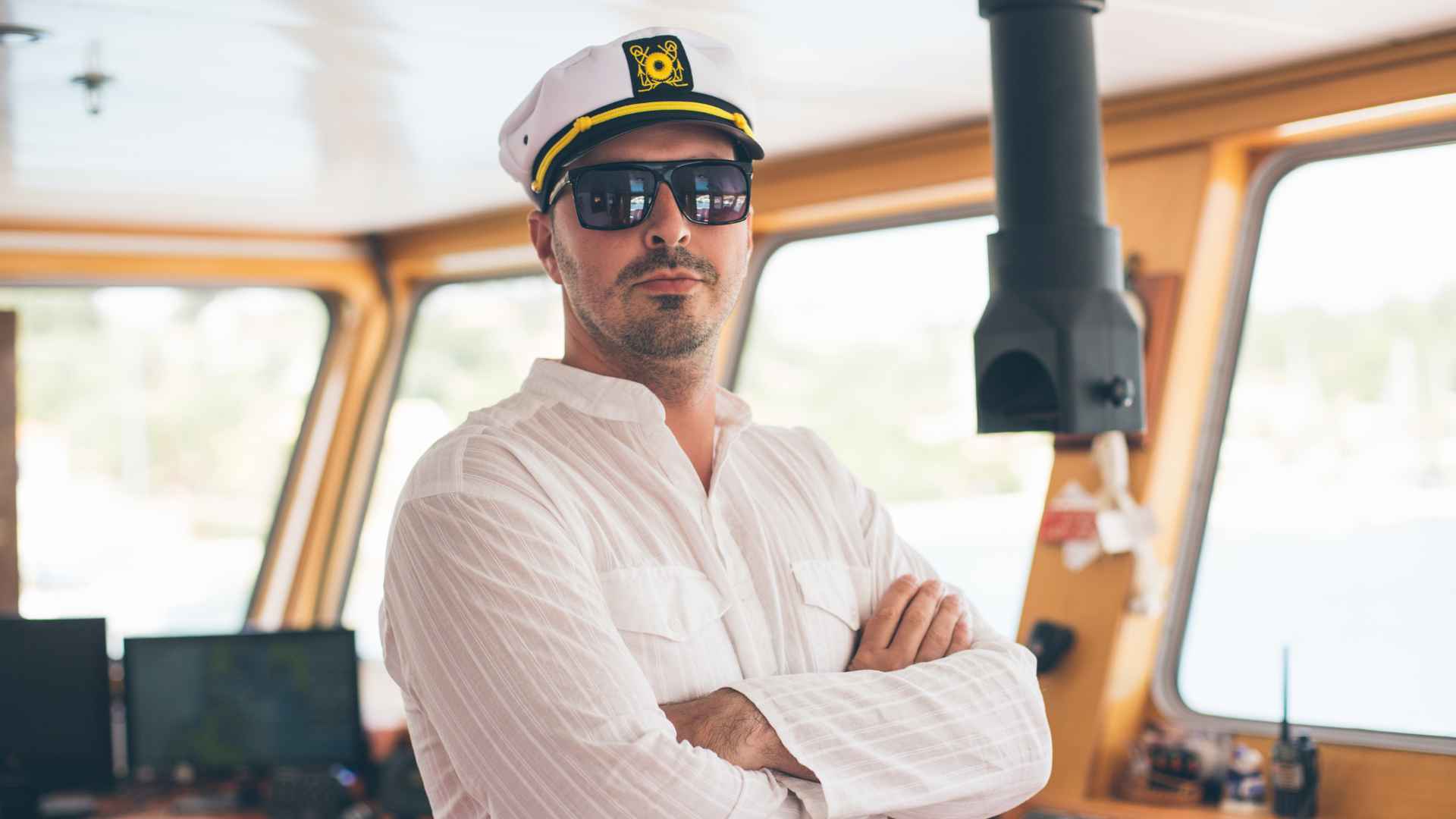
Network and establish connections:
Networking within the yachting industry is crucial for advancing your career as a yacht captain. Building relationships and establishing connections can lead to new opportunities and career growth. Here are some key points to consider:
- Industry Events: Attend industry events, such as yacht shows, maritime conferences, or trade fairs. These events bring together professionals from the yachting industry and provide opportunities to network, learn about new developments, and establish connections with yacht owners, brokers, and industry leaders.
- Professional Associations: Join professional associations and organizations related to yachting and maritime industries. These associations offer networking events, educational resources, and career support. Examples include the Professional Yachting Association (PYA), International Superyacht Society (ISS), or local yachting associations.
- Yacht Brokers and Crew Agencies: Build relationships with yacht brokers and crew agencies. Yacht brokers can connect you with potential employers and job opportunities, while crew agencies can assist with crew placement and career guidance. Stay in touch with them, provide updates on your experience and qualifications, and maintain a professional rapport.
Networking allows you to stay connected with industry professionals, increase your visibility, and access a broader range of opportunities.
Continue learning and professional development:
Continuous learning and professional development are essential for growth and advancement as a yacht captain. Here are some key aspects to consider:
- Stay Updated on Industry Advancements: The yachting industry is constantly evolving, with new technologies, regulations, and best practices emerging. Stay informed about industry trends, updates in safety protocols, navigation technologies, and regulatory changes. Read industry publications, follow reputable online sources, and attend relevant training sessions or workshops.
- Advanced Training and Specialized Certifications: Consider pursuing advanced training courses and specialized certifications to enhance your knowledge and skill set. These can include courses on advanced navigation techniques, superyacht operations, crisis management, leadership development, or specific technical skills like engine maintenance or electrical systems. These additional qualifications make you more competitive in the job market and broaden your career prospects.
- Professional Development Programs: Some organizations and institutions offer professional development programs tailored for yacht captains. These programs focus on leadership skills, management strategies, and industry-specific knowledge. Participating in such programs can enhance your leadership abilities, expand your network, and open doors to new opportunities.
Continuously investing in your learning and professional development demonstrates your commitment to excellence and positions you as a knowledgeable and competent yacht captain.
By networking within the industry, attending industry events, joining professional associations, and staying updated through continuous learning, you can advance your career, establish valuable connections, and position yourself for further growth as a yacht captain.
Watch What it takes to become a superyacht captain! | Video
Top 5 FAQs and answers related to How to Become a Yacht Captain
What qualifications do i need to become a yacht captain .
To become a yacht captain, you typically need to obtain the necessary licenses and certifications. The specific qualifications can vary depending on your location and the type of yacht you wish to captain. Common requirements include accumulating sea time, completing relevant training courses (such as navigation, safety, and emergency response), and passing licensing exams.
How do I gain the required sea time as a yacht captain?
Accruing the required sea time is an essential aspect of becoming a yacht captain. You can gain sea time by working as a deckhand or crew member on yachts, participating in internships or apprenticeships, or volunteering on boats. Keeping accurate records of your sea service days, duties performed, and the vessels you’ve worked on is crucial for meeting the licensing authority’s requirements.
Where can I find training courses for aspiring yacht captains?
There are various options for training courses related to becoming a yacht captain. You can find courses offered by maritime academies, vocational schools, yacht training centers, and professional organizations. Look for courses covering topics such as navigation, seamanship, safety procedures, and marine regulations. Additionally, licensing authorities often provide resources or recommendations for approved training providers.
How long does it take to become a yacht captain?
The time it takes to become a yacht captain can vary depending on individual circumstances, such as prior experience and the amount of time dedicated to training and gaining sea time. It can take several years to accumulate the required sea time, complete training courses, and pass licensing exams. The process also depends on your commitment to acquiring the necessary skills and qualifications.
Is it necessary to have sailing experience to become a yacht captain?
While sailing experience can be beneficial, it is not always a strict requirement to become a yacht captain. Many yacht captains start their careers with motor yachts or work on power-driven vessels. However, having sailing experience can provide you with a broader understanding of boat handling, wind patterns, and sail operations, which can be advantageous in certain yachting environments. It’s important to check the specific requirements and preferences of the licensing authority and potential employers in your desired field.
Conclusion:
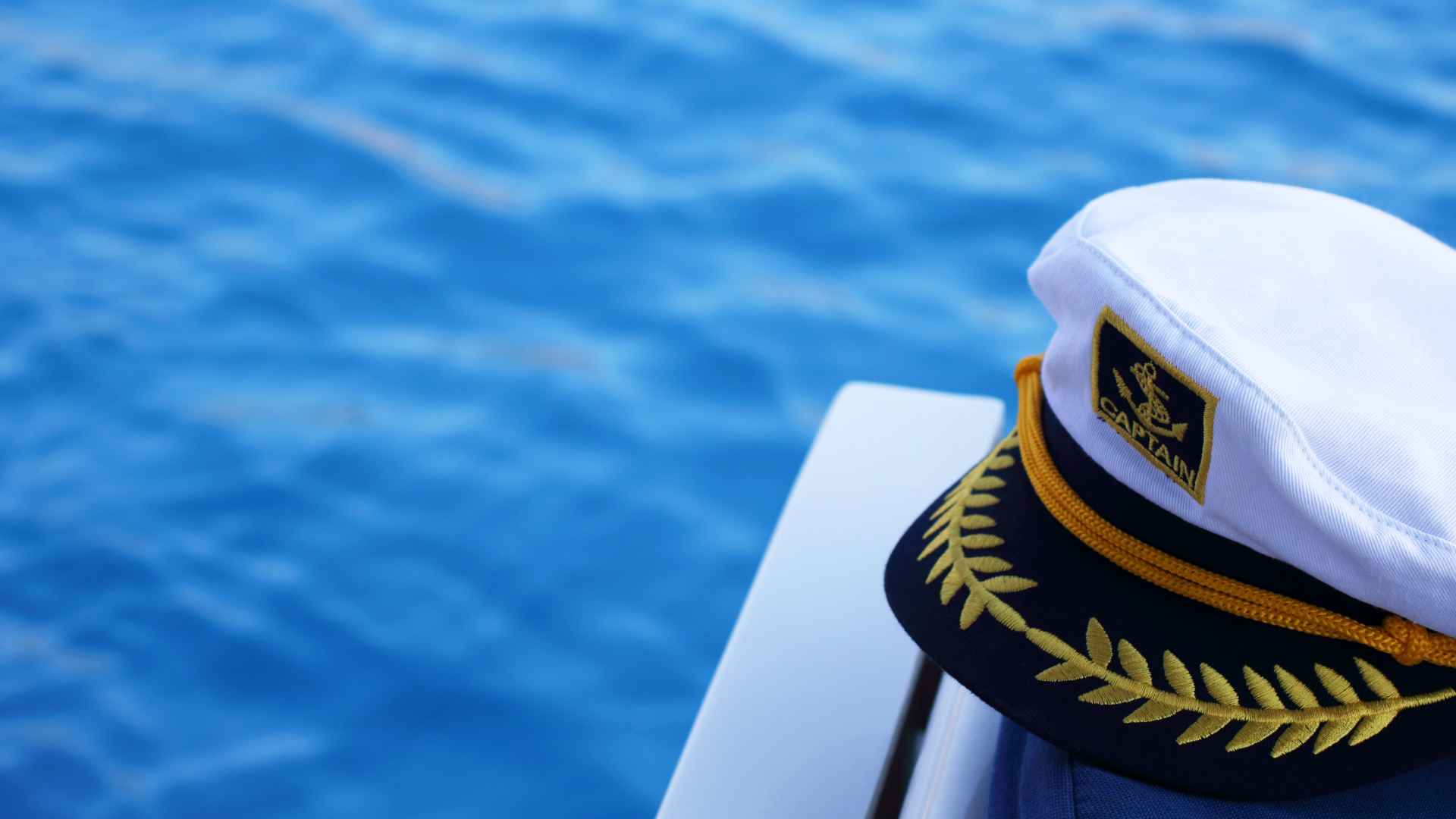
Becoming a yacht captain involves several key steps and considerations. Here’s a summary of the article’s main points:
- Gain Experience: Start by acquiring foundational boating knowledge, understanding navigation rules, weather patterns, and basic boat handling. Seek opportunities to work as a deckhand or crew member on a yacht to gain hands-on experience and learn about yacht operations and teamwork.
- Obtain Licenses and Certifications: Familiarize yourself with the licensing authorities relevant to your location, such as the US Coast Guard or Maritime and Coastguard Agency (MCA). Understand the specific requirements and application processes for obtaining the necessary licenses, which may involve sea time, training courses, and passing examinations.
- Focus on Professional Development: Continuously learn and stay updated on industry advancements. Consider advanced training, specialized certifications, and professional development programs to enhance your skills and knowledge as a yacht captain. This demonstrates your commitment to excellence and broadens your career prospects.
In conclusion, embarking on the journey to become a yacht captain requires dedication, practical experience, and a commitment to ongoing learning. By gaining experience, obtaining the required licenses, and focusing on professional development, you can position yourself for a rewarding career as a yacht captain. The open seas await, offering exciting adventures and the opportunity to lead a skilled crew while navigating luxurious yachts. Start your journey today and set sail towards an incredible future as a yacht captain.
Share How to Become a Yacht Captain? Step-By-Step Guide with your friends and Leave a comment below with your thoughts.
Read How to Build a Casting Deck in an Aluminum Boat in 6 Steps? until we meet in the next article.
Similar Posts
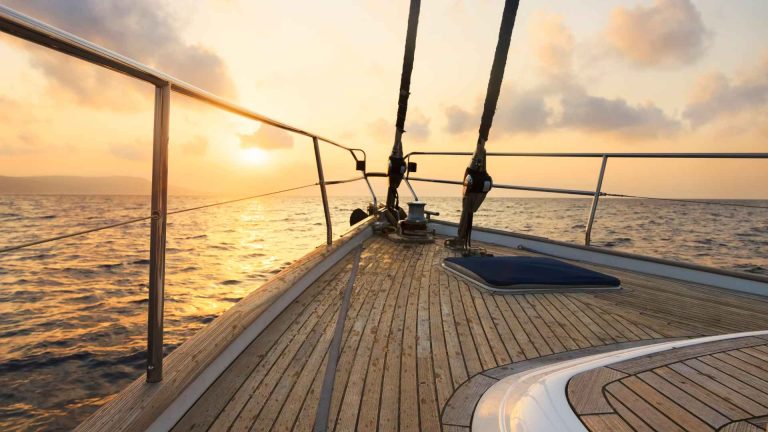
What Is the Best Country to Register a Yacht: Facts to Know
Owning a yacht brings a world of luxury, adventure, and boundless possibilities on the open seas. Whether you’re a passionate sailor or an avid explorer, yacht ownership is an exciting journey. However, amidst the thrill, it is crucial to navigate the legal and administrative aspects of yacht registration. Choosing the right country for yacht registration…
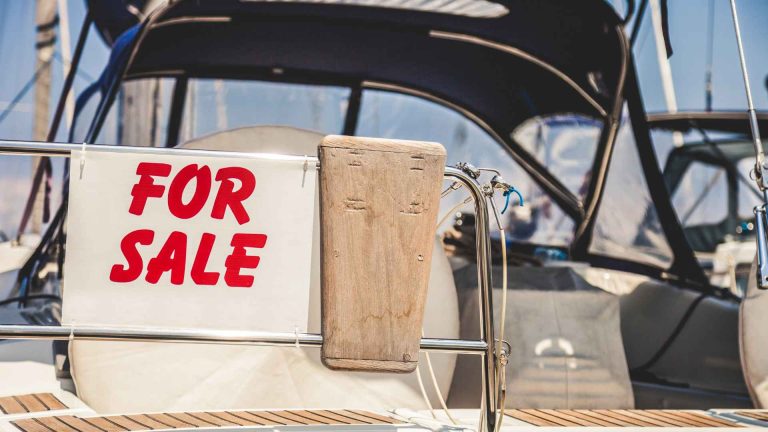
How to Become a Yacht Broker to Sell Your Own Boat? Guide
Becoming a yacht broker to sell your own boat can be a rewarding venture, offering a range of advantages. As a yacht owner, you have firsthand knowledge of your vessel, its unique features, and its history. By taking on the role of a yacht broker, you can leverage your expertise to effectively market and sell…

Can You Work on a Superyacht with Tattoos? Guide
Superyachts, the epitome of luxury and opulence, have long captivated the imaginations of those with a taste for the high life. These magnificent vessels, adorned with lavish interiors and offering unrivaled experiences on the open seas, have become a symbol of prestige and exclusivity. But as the allure of superyachts beckons, one question often arises:…
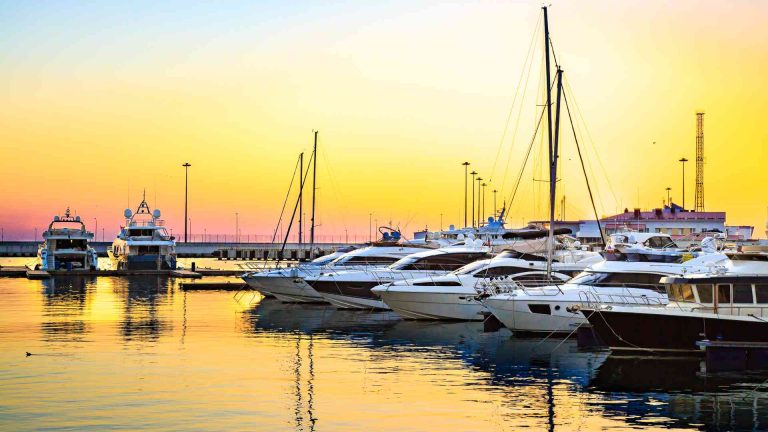
Superyacht vs. Mega Yacht: What’s the Difference? Guide
The glimmering azure waters, the gentle sea breeze, and the feeling of freedom as you sail across the open ocean – it’s no wonder that luxury yachts have captured the imagination of many. For those seeking the epitome of opulence on the high seas, the terms “Superyacht” and “Mega Yacht” evoke images of grandeur, extravagance,…

How to Become a Stewardess on Yachts in 5 Steps: Guide
Picture yourself amidst sparkling turquoise waters, basking in the warm rays of the sun, and indulging in the luxurious lifestyle of the high seas. Working as a stewardess on yachts offers a unique and enchanting opportunity to turn this dream into reality. From sailing across idyllic destinations to serving the needs of esteemed guests, this…
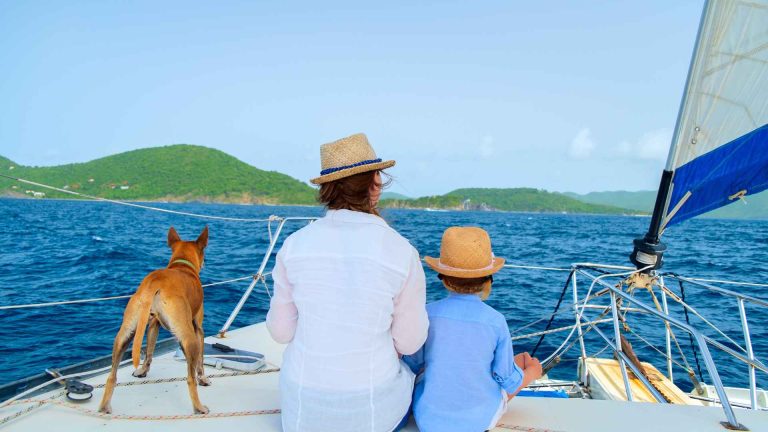
Can You Live on a Yacht? and if so, for How Long? – Guide
Living on a yacht evokes images of sun-kissed days, sparkling waters, and a carefree existence. The allure of a yacht lifestyle has captured the imagination of many, with its promises of adventure, luxury, and a break from the conventional. From the glamorous depictions in movies to the envy-inducing social media posts of jet-setters, it’s easy…

A day in the life of a superyacht captain
It’s easy to think that a captain’s job is to drive a superyacht to glamorous locations and drop the anchor in idyllic anchorages, but as Kelly Gordon and other captains will tell you, that’s only a tiny part of the role.
For Kelly Gordon, captaining a superyacht was something she never imagined until she had already started a career as a chemistry professor when a chance encounter at a party on a large motor yacht changed everything. Now, having uncovered her passion for the sea and having achieved the ultimate position as a superyacht captain, Gordon is not only a role model for female crew who want to pursue a career on the deck and engineering side of superyachts, but is also an active advocate of crew mental health. But what exactly does a superyacht captain do, and is it just about driving the yacht from A to B and making sure the crew keep it in top condition?
The simple answer, says Gordon, is no – and in fact the role of a modern yacht captain is highly complex and multifaceted. Take Gordon’s current command, for example – a 33-metre private yacht that cruises extensively with the owning family on board. “My responsibilities of course encompass safely operating and navigating the boat – that’s the technical side of it,” Gordon begins. “But actually the smallest element is navigation and operation, and the far bigger side is crew management. I spend a tremendous amount of time with the crew, making sure everyone’s got what they need.
“Along with that too,” she continues, “is making sure that the owners and their family have what they need, and understanding what their plans are. Where do they want to go? What are they wanting to do? It’s about making sure they are always well cared for.”
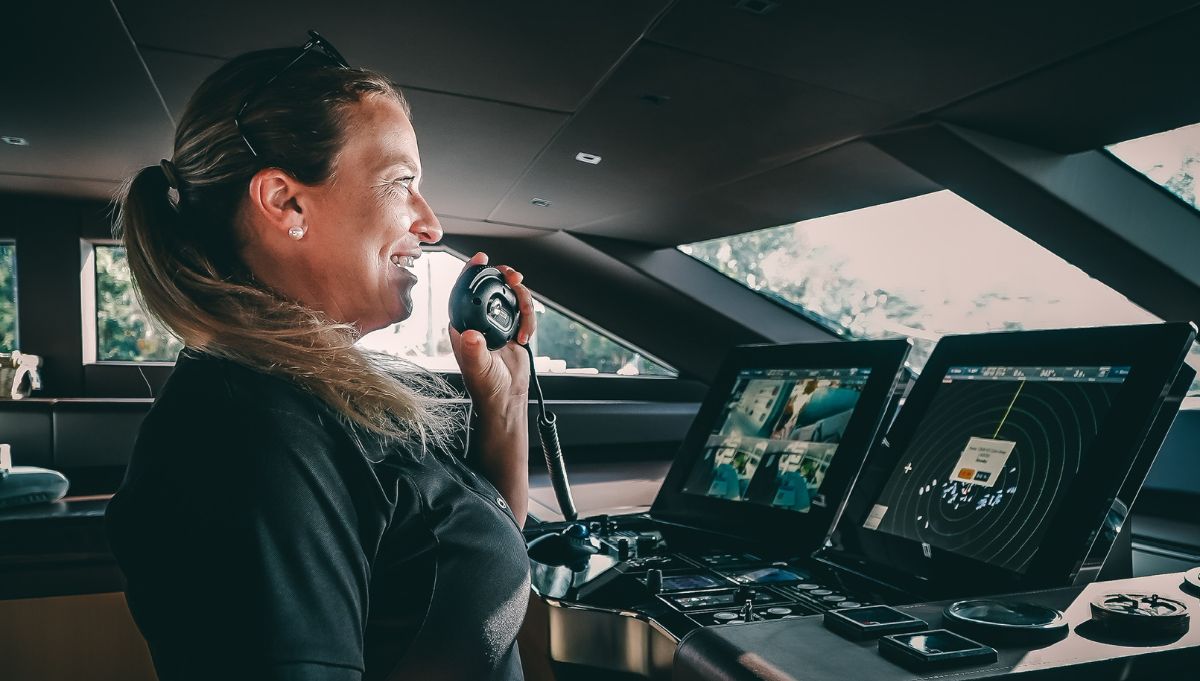
Changing landscapes
The early days of yachting were, in some ways, a much simpler time. Yachts on average were smaller, and captains and crews often came from a sailing or boating background. There were elements that a captain had to understand and undertake, such as holding a recognised commercial skipper’s ticket, keeping logs, managing the yacht’s accounts and so on. But as the fleet has grown and as yachts have grown, so too have the duties expected of captains.
“As a captain, especially the larger and larger you go in terms of yacht, you become the CEO of a company in a way,” Gordon offers. “But you’re doing what you’re trained to do. To operate and navigate the yacht actually ends up being the smaller percentage of what you do, and the day-to-day is emails, paperwork, schedules, plans, maintenance if you’re in the shipyard, and whether you charter or are private you still need to know where the boss or potential guest wants to go, and show them a good time.”
Paper tigers
One thing that has definitely changed over time is the increasing burden of paperwork related to regulatory elements such as the International Safety Management code (ISM) and in some cases the International Ship and Port Facility Security Code (ISPS). “The biggest change I’ve seen since I started is a regulatory change,” offers Captain Steve Osborne . “I find myself spending more and more time on more and more paperwork. There’s a lot of delegation you can do, but you have to really start to understand a lot of the legal frameworks of where you’re going [with the yacht] and be a bit more cautious and pay a bit more attention, because rules have changed over time and are a bit more stringent now.”
Gordon agrees that the burdens have increased, but also argues that there are benefits. “The paperwork has grown, but I think it’s a good thing,” she asserts. “I actually think there probably can stand to be a little more regulation in the industry. When I talk to my buddies who are working on commercial vessels and I see how things are done – granted, they have their own sets of issues as well – I think it’s good that we take a page or two out of their book.”
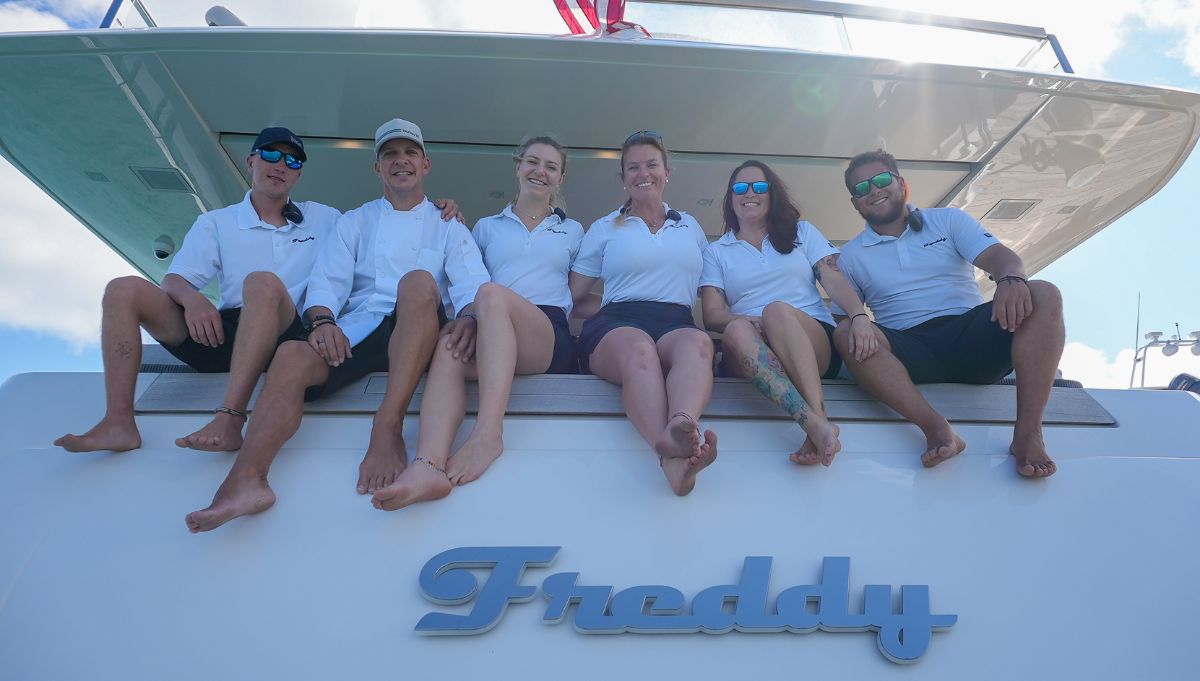
Mind over matter
One of the biggest elements of being a superyacht captain is being able to look after a superyacht crew, and that means not only nurturing and mentoring crew members but also, increasingly, being aware of other issues that can arise – particularly when crews are living in close quarters and working long hours.
“The driving-the-boat bit is easy, that’s our bread and butter,” says Captain Matthew Pownell-Jones. “It’s the other stuff that no one actually teaches you – how to care about the crew, how to listen to someone who has maybe just joined the crew and has a problem that no one knows about. The crew is a floating family, and if that’s the way you think of it then that’s how I feel a team works well.”
It’s something that Gordon has put front and centre not only of how she runs her own yacht and crew, but also of raising awareness in the industry of the importance of mental health considerations. “I’m pretty hard-charging in the mental health space for crew and the yachting industry,” she says. “I’m determined that we will see change, and will see a better and safer workplace for crew, both in terms of general safety on board and also in terms of mental safety.
“I’m not that old – I am only 42 – and just over the course of my life and in my 15 years in this industry I’ve seen it change in terms of being able to talk about it, and it being accepted as a conversation and as part of our overall health. It’s so important because on board we don’t work a nine-to-five then clock out and get to go home to our safe space.”
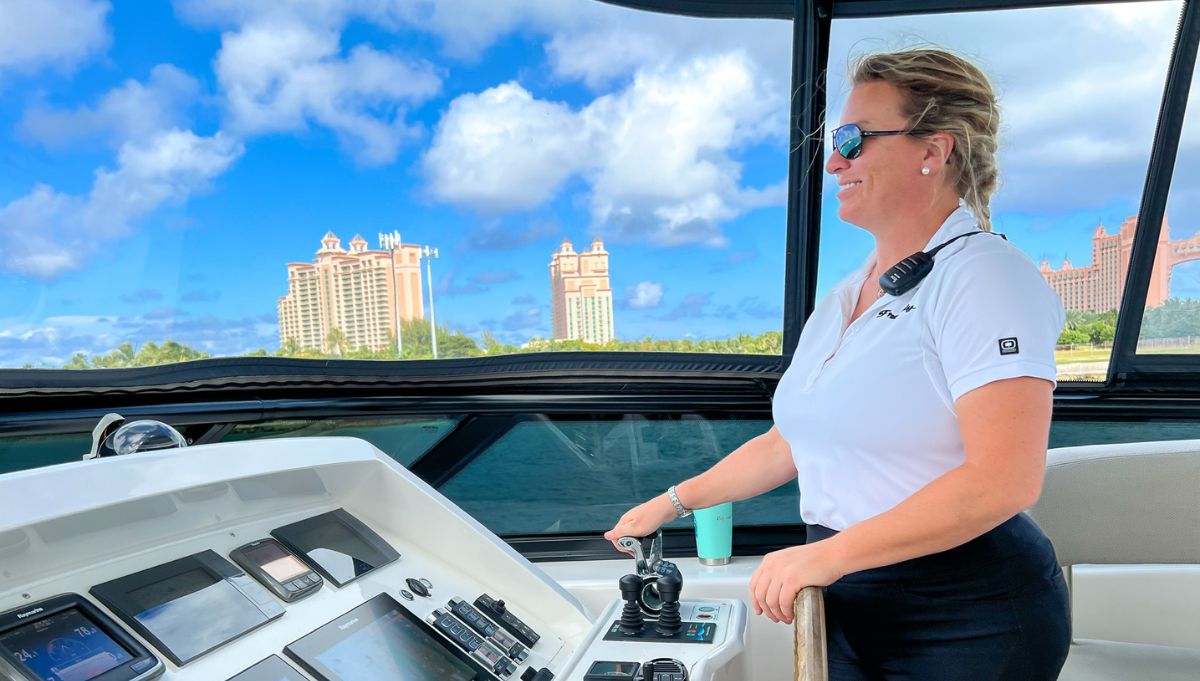
Guest appearance
For all the paperwork, planning and crew management, there is of course the part that makes superyachting what it is – yacht owners and yacht charterers enjoying what a superyacht offers and the places it can take them. It’s perhaps the final piece of the puzzle for an experienced superyacht captain.
“For private cruising or for yacht charter alike, first of all, you want to make sure the yacht is clean and ready to present to the boss or the guests and that each crew member knows who’s doing what,” Gordon enthuses. “If it’s a little booze cruise, the stews need make sure all the drinks are on board and that the yacht interior looks pretty nice and warm and fuzzy. My engineer has to make sure everything’s operating and working, and then the guys on deck make sure that everything’s taken care of on the exterior.
“Then with me, it’s communicating back and forth with the family or the charter guests as to where they want to go or what they want to do, and then communicating that to my crew. And when it gets busy and the days get long, with the crew potentially on call, I try to balance everything by making sure everyone is getting breaks, and offsetting the crews’ functions so that there’s always someone up with the guests and always someone getting some rest to be able to relieve whoever’s on duty.
“People ask me that the best part of my job as captain is outside being able to utilise my skill of navigation and operation of the yacht,” she concludes, “and my favourite part of the job is also the most difficult part – and that’s the crew. I love them to death. My current boat is a happy, fun, loving, playful, hard-working professional boat, but it’s taken a long time to put that together. If you work at it as a captain and you put the time in and invest in finding and mentoring, you can create that.”
Do you work in the superyacht industry? Yes No I would like to receive updates from Superyacht Life
Don’t miss out
Sign up to our newsletter and get our latest stories delivered monthly to your inbox.
Impartial training and careers advice
Call us: +441983 280 641
+441983 280 641
What qualifications do you need to work on a Superyacht?
- What qualifications do you need to work ...
Wondering how to get a job on Superyachts? One of the first things you’ll need to consider is your qualifications! In this blog, we’ve outlined the mandatory and desirable certifications you’ll need to start applying for your dream job on the ocean…
Whilst Superyacht jobs are (of course) among the best in the world, they do have a few similarities with your average 9-5-er…
…Namely, in that there are specific qualifications you’ll need to have in order to be considered for a role.
What’s more, as well as mandatory qualifications and certifications, there are some “desirables” that are useful to have under your belt, and that will help you stand out from the crowd of Superyacht job applicants!
We’ve shared all these below – so, if you’re wondering how to get a job on Superyachts and want to know what qualifications you need, be sure to read on…
The mandatory qualifications you need to work on Superyachts are:
1. eng1 medical certificate.
First things first, you’ll need to get your ENG1 Medical certificate – something that is required of all “ seafarers .”
In a nutshell, this certificate demonstrates that you have the level of health and fitness required to carry out work on board a Superyacht safely, both in your day-to-day role and in emergencies.
It’s based on international guidelines from the Standards of Training, Certification and Watchkeeping for Seafarers (STCW), the Maritime Labour Convention (MLC) and the Internal Maritime Organization (IMO) / International Labour Organization (ILO) guidelines on medical examinations of seafarers.
During this medical examination, a doctor will ask you about your medical history, and you’ll be weighed, measured, tested on your hearing and sight, given a physical examination, and asked to provide a urine sample.
There are three outcomes you can receive from the ENG1 Medical; fit without restrictions, fit with restrictions, or temporarily or permanently unfit.
You’ll need to be classified as fit without restrictions or fit with restrictions in order to pass (though “with restrictions” means you’ll be limited on the places you can go and activities you can undertake).
Once you’ve passed, the certificate lasts a full two years.
Colour blindness (assessed in the Isihara plate screening part of the medical) can unfortunately cause you to fail your ENG1 Medical examination; however, there are way around this, which we’ve shared in our “What if I fail my ENG1 medical” blog .
You can also find out more about this certification, what it involves and how you can get yours in our dedicated “The ENG1 Medical” blog.
2. STCW Basic Safety Training certification
Once you’ve passed your ENG1 Medical, you can move on to the second mandatory qualification for Superyacht jobs; STCW Basic Safety Training .
This is a requirement for anyone who wants an office on the ocean, and on any commercial vessel, including cruise ships, ferries, and, of course, Superyachts.
As mentioned above, STCW stands for Standards of Training, Certification, and Watchkeeping. It first came about in 1978, and was most recently amended in 2010.
With this qualification, you’ll be able to demonstrate to Superyacht employers that you have the knowledge and practical experience to respond to an emergency on board.
To achieve this certification, you’ll need to attend and actively participate in all the following training elements:
- Fire Fighting and Fire Prevention
- Personal Safety and Social Responsibilities (PSSR)
- Proficiency in Security Awareness (PSA)
- Sea Survival
- Elementary First Aid
This is just one of the courses we run here at Flying Fish (we’re recognised by the MCA to deliver it), both on its own and as part of our Superyacht Deckhand and Superyacht Stewardess courses, among others.
To find out more about the course and what it involves, be sure to visit the STCW Basic Safety Training page of this website!
Some other “desirable” qualifications you should also consider include:
1. online mca proficiency in designated security duties (pdsd).
This course (which is typically completed in a single day) will qualify you to undertake security-related duties onboard a Superyacht – it’s a great extra to have on your Superyacht CV !
2. RYA Powerboat Level 2
Anyone planning to work professionally in the Superyacht industry will benefit hugely from this qualification , as they’ll be required to drive tenders and other support craft on board a Superyacht.
3. RYA VHF Radio
An absolute must for anyone planning to work at sea, this qualification will demonstrate your proficiency in operating a VHF/DSC radio device, and your understanding of radio language, etiquette, and emergency procedures.
… all of which are included our Superyacht Stewardess and Superyacht Deckhand courses at Flying Fish!
What’s more, on our course to become a Superyacht Deckhand , you’ll also undertake and receive qualifications for:
- Superyacht Deckhand Certificate
- RYA Personal Watercraft Course (PWC)
- RYA Diesel Engine Maintenance
- Ropework, essential knots and splicing
- Maintenance day, teak work, repairs, washdowns, cleaning the stainless yacht maintenance
- RYA two-day boat handling course
And should you choose to sign up for our course to become a Superyacht Stewardess , you’ll undertake and receive qualifications for:
- Superyacht Interior Certificate
- CIEH Food Safety Level 2
- Barista training, wine appreciation and cocktail mixing courses
- Customer service training
In addition, you’ll be able to increase your chances of getting a job on Superyachts even more by having the opportunity to attend our Superyacht Recruitment Event in Antibes, use our free online recruitment service, and undergo our specialist CV clinic.
Hopefully, all the above will have given you more insight into qualifications and how to get a job on Superyachts.
If you’d like to undergo any of the qualifications we’ve shared in this blog, don’t hesitate to give us a call and we’ll get you booked in!
Get qualified today
Related articles
- Seafarers Tax
Do I need to pay off my Student loan if I work on a Superyacht?
Good question! First, let me say that the information below is aimed at people who have studied in the UK and took out a Student Loan to cover course ...
Have I got the right experience to work in yachting?
If you’re thinking about working on board a Superyacht, we share the skills and experience you need and how to get into the yachting industry in thi...
Download – Ultimate Guide to Working on Superyachts
So you’re thinking about getting a job on a Superyacht? Having a career on a Superyacht is a dream job: it will change your life forever. You g...
UKSA Superyacht Cadetship Course
From cadet to officer on superyachts.
Are you between 18-25 and looking for an exciting career on superyachts? The UKSA Superyacht Cadetship Course is a structured programme designed to train the future officers of the superyacht industry.
A great alternative to university, we run two courses a year starting in March and in August.

About the Superyacht Cadetship Course
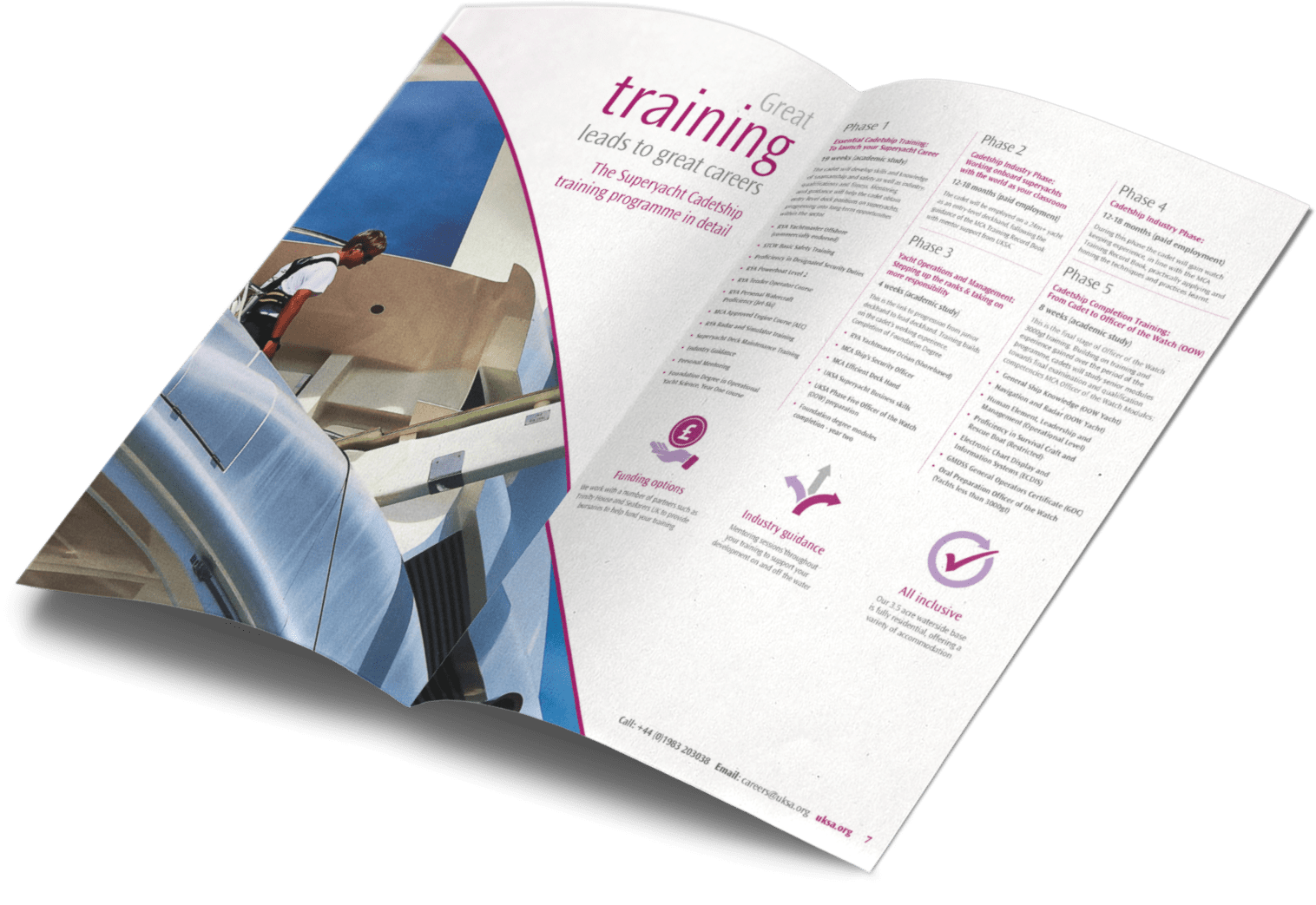
The UKSA Superyacht Cadetship is a structured four-year programme designed to train the future officers of the superyacht industry.
Designed in consultation with the MCA, the Superyacht Cadetship combines the most relevant training and mentoring in the industry. It equips graduates with a strong foundation of knowledge alongside offering a realistic understanding of what it takes to succeed in a career in the Superyacht industry.
The four-year programme is a career path to STCW II/1 Officer of the Watch (Yacht <3000GT) and progressing to the STCW II/2 Master (Yacht <3000GT) qualification.
Cadets also have the opportunity to undertake a Foundation Degree in Operational Yacht Science during phase 1 and 3 of the Superyacht Cadetship, awarded by Plymouth University. This option provides additional career and training pathways into different sectors in the maritime industry.
The programme offers some significant advantages. Whilst the average debt for a University student in the UK can amount to £35,000 to £40,000, at UKSA our students can earn while they learn. This ensures they are able to pay off course fees while actively working and training within the industry.
Please note: On occasion your sea phases may involve travelling outside of the UK. Therefore, to avoid restricting sailings we highly recommend that all Professional Yachtmaster Offshore students/Cadets are vaccinated against Covid-19 with the current maximum number of doses.
Please note this is not mandatory in order to complete the course but a recommendation.
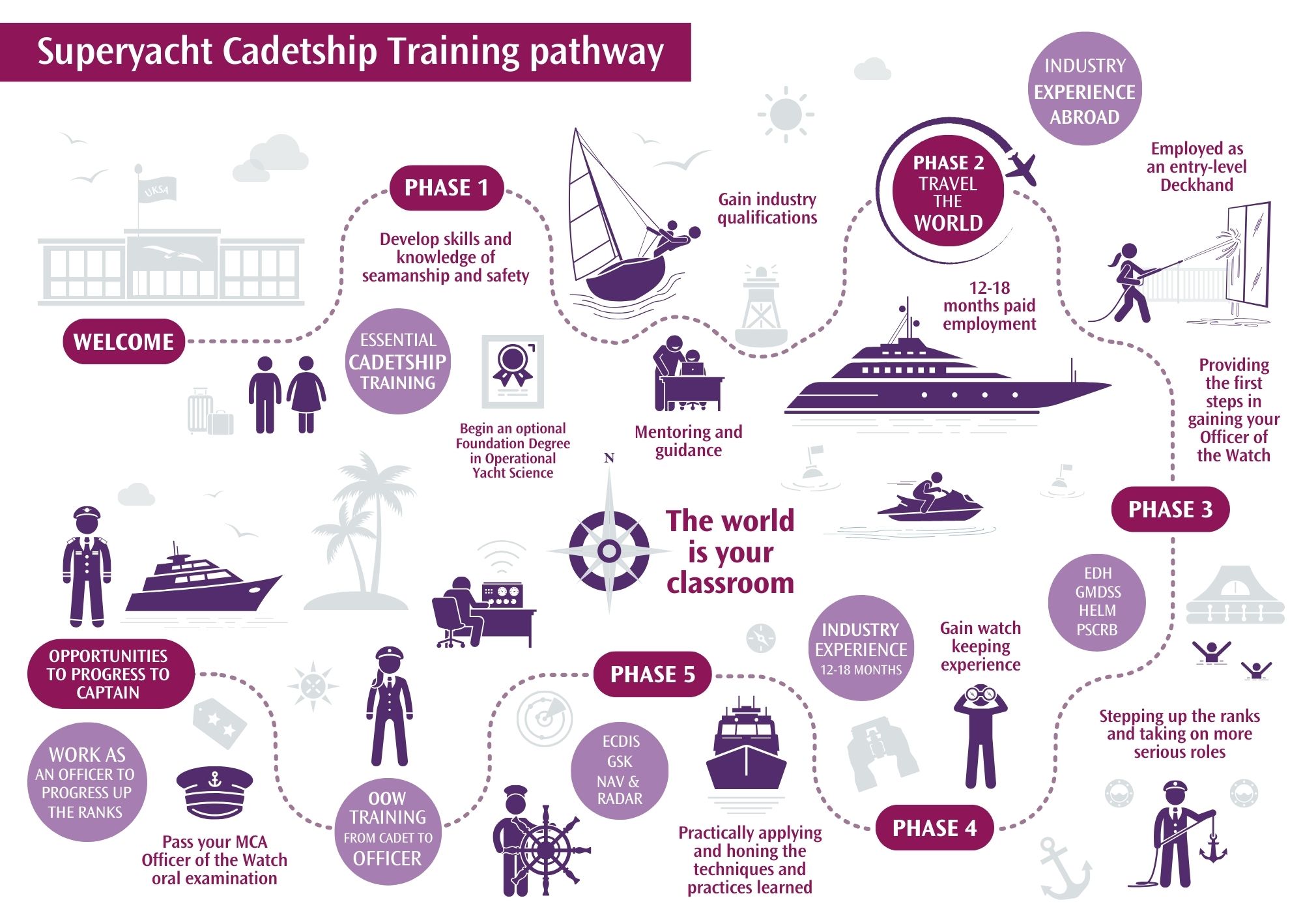
Download our Superyacht Cadetship Pathway Infographic
Superyacht Cadetship course stages
Phase 1 – Essential Cadetship training t o launch your superyacht career – 160 days (academic study)
The Cadet will develop skills and knowledge of seamanship and safety as well as industry qualifications. Mentoring and guidance will help the Cadet obtain entry-level deck positions on superyachts, progressing into long-term opportunities within the sector.
Qualification gained
- RYA Yachtmaster Offshore
- STCW Basic Safety Training
- RYA Powerboat Level 2
- RYA Personal Watercraft Proficiency (Jet-Ski)
- RYA Radar and Simulator training
- RYA Short Range Radio
- RYA Tender Operator Course
- MCA Proficiency in Designated Security Duties
- MCA Approved Engine Course
- Superyacht Deck Maintenance Training
- Foundation Degree in Operational Yacht Science (First year of study)
Phase 2 – Industry experience working onboard superyachts – the world is your classroom – 12-18 months (paid employment)
Our Cadets will be employed on a superyacht as an entry-level deckhand, following the guidance of the MCA Training Record Book with mentor support from UKSA.
Phase 3 – Yacht operations and management stepping up the ranks and taking on more serious roles – 3 weeks (academic study)
This is the link to progression from junior deckhand to more senior positions onboard, such as lead deckhand or bosun. Training builds on the Cadets working experience and provides the first steps to gain their Officer of the Watch (Yachts less than 3000gt) qualification. Cadet’s who are also completing the second year of the Foundation Degree will move forward with their coursework (Additional time-based at Falmouth University) and using the knowledge gained from working on board and training at UKSA, move closer to gaining their FDSC in Operational Yacht Science.
Qualifications gained
- MCA Efficient Deck Hand (EDH)
- MCA Human Element, Leadership and Management (Operational Level)
- RYA Yachtmaster Ocean (Shorebased)
- Foundation Degree in Operational Yacht Science, Year Two completion
Phase 4 – Industry experience 12-18 months (paid employment)
During this phase, the cadet will gain watch keeping experience, in line with the MCA Training Record Book. Practically applying and honing the techniques and practices learned.
Phase 5 – OOW Training from Cadet to Officer of the Watch (OOW) – 8 weeks (academic study)
This is the final stage of Officer of the Watch 3000gt training. Building on training and experience gained over the period of the course, cadets will study senior modules towards final examination and qualification competencies MCA Officer of the Watch Modules.
Qualification gained:
- General Ship Knowledge (OOW Yacht)
- Navigation and Radar (OOW Yacht)
- Proficiency in Survival Craft and Rescue Boats Other Than Fast Rescue Boats (Restricted)
- Electronic Chart Display and Information Systems (ECDIS)
- GMDSS General Operators Certificate (GOC)
- Oral Preparation Officer of the Watch (Yachts less than 3000gt)
Confirmed selection dates :
- 11 th – 12 th April 2024
- 28 th – 29 th May 2024
Assisted funding available
As a great alternative to University, our cadets can graduate debt-free
As a charity, we have funding opportunities available for many of our students. UKSA can help with assisted funding towards the Superyacht Cadetship Programme. Please follow the link for further information on UKSA’s Superyacht Cadetship funding . Alternatively, please talk to one of our course advisers who will be able to provide you with further information on the funding that is available and assess your eligibility.

Please note, even if you are not eligible for financial support, most of our Cadets earn enough during the work phases to more than cover the next phases of training. You really could graduate debt free, with all the required qualifications and experience to work at the pinnacle of the superyacht industry.
Meet the Cadetship Manager

James has extensive knowledge and skills from working on superyachts to teaching a variety of MCA modules. He has passed all the courses students will be completing on the Cadetship, so has first-hand knowledge of the entire programmes. He has also completed his MCA oral exam to gain his OOW 3000gt ticket and teaches these courses to our students with impressive feedback.
With the wealth of experience both working and teaching in the industry, James is perfectly positioned to support our Superyacht Cadets to ensure they fulfil their potential and rise through the ranks to progress their careers on superyachts.
Superyacht Cadetship requirements
- You must be aged 18-25 when you start the Superyacht Cadetship, but can apply when you are 17 if you wish.
- Excellent communication, oral and written skills, are essential, as is a good understanding of mathematics.
- Cadets should ideally have GCSEs grades 9-4 (or equivalent) in English, Maths & Science.
- If applying for the Foundation Degree alongside the Superyacht Cadetship 48 UCAS points are required.
- All seafarers must have an ENG1 seafarer medical fitness certificate to work at sea (click here for more details).Whilst it’s not essential to hold your ENG1 to complete your training with UKSA, it is required to hold this to secure work in the industry. For this reason, we recommend all students gain their ENG1 before they attend training.
- To apply, you will need to contact a course adviser who will provide you with an application form to complete and discuss your suitability.
- The next step is to book a cadet selection at UKSA. Our selections are usually run over two days. On the selection you will be required to deliver a detailed presentation on a superyacht of your choice and sit an interview with UKSA’s cadetship selection panel, where you will be required to demonstrate a proven interest in a long-term career within the superyacht industry.
Create your success story today
To learn more about the selection event and how to apply, please call us on +44 (0)1983 203038 or email [email protected]
Here are some frequently asked questions on the Superyacht Cadetship.
What is a cadetship?
Do you get paid for a cadetship.
The 12-18 month paid placement can be with a number of different providers. It is not possible to give a figure of the actual amount that a cadet would earn. If you’d like to know more details about what to expect, please contact us and we’ll be able to give you a more accurate figure based on upcoming placements.
What is a cadetship program?
The unique cadetship program at UKSA is aimed at those wanting a career in the maritime industry, specifically at full progression to be a superyacht captain. The 5-phase structure builds technical knowledge and experience, gains industry qualifications, and real industry experience, travelling around the world.
How to get a cadetship?
See the apply now section to find out more. There are some cadetship requirements to make sure you quality for acceptance, and there are funding opportunities available for candidates that qualify.
What are the benefits of a cadetship?
The cadetship programme at UKSA is unique, we’re the only ones that offer this type of structured pathway. It’s a fantastic alternative to university and provides an entry to the amazing world of working on board a superyacht. You’ll get industry qualifications alongside real world experience, providing you with all the skills you need in your future career.
Why train with UKSA?
From our unique waterfront campus in Cowes, on the Isle of Wight, we have a wide range of facilities and fleet to ensure that our students have the very best learning experience. This course is all-inclusive, meaning everything is on site and all of your food and accommodation is included, so you can focus on your training.
Don’t just take our word for it
“I particularly like UKSA’s well structured and organised approach. It feels more like going to university than your typical sailing centre.”
Get free careers advice
- First name *
- Last name *
- How did you hear about UKSA? * –None– Absolutely Education magazine Below Deck Bestadventurejobs.co.uk Bluedome.co.uk Careers-in-sport.co.uk Cowes Harbour Handbook EscapeTheCity.org Event Facebook Falmouth Marine School General Knowledge Google Ads Independent School Parent Senior Instagram IOW College IwCollege.ac.uk Neilson Outdoor collateral Press Referral RYA Dinghy Show RYA magazine RYS Sailing Today with Y&Y Sea Cadets UK Solent Handbook & Directory Southampton Boat Show Superyacht Knowledge SuperYachtNews.com The Apprenticeship Guide The Price is Wight The SuperYacht Report Website Yotspot.com
- General notes
- Opt-in to receive course information and relevant offers
- Accept Privacy Policy and Terms and Conditions .
- Comments This field is for validation purposes and should be left unchanged.
You may also be interested in
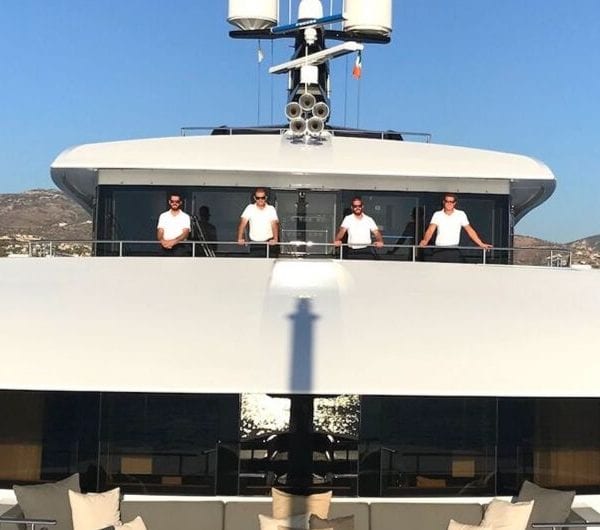
Need help finding the right course for you?
Speak to an advisor on +44 (0)1983 203038 or email us
superyachtindustrycareers.com

Discover your path to a rewarding career in the Superyacht Industry with our comprehensive guides
Career maps providing an awareness of the requirements for each onboard position.
Career maps providing an awareness of the requirements for a range of positions onshore. COMING SOON
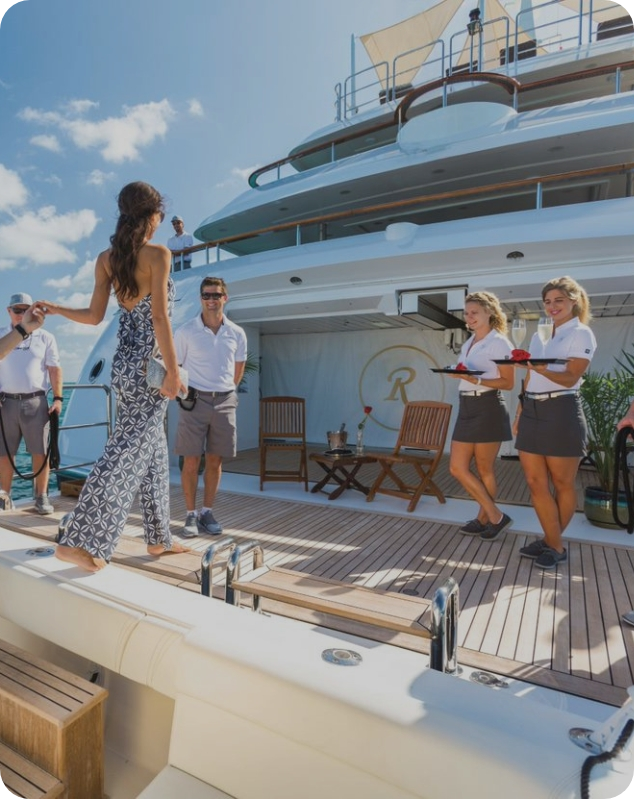
Yacht Crew work within four main departments, Deck, Engineering, Interior and Galley (kitchen), some vessels, may also require a Purser, and / or specialists. Within each department there is a progression from junior levels up to head of departments, with the Captain being the highest-ranking person onboard.
Bridge, Deck and Watersports Operations
Interior Crew
Food & Beverage, Housekeeping, Valet and Specialists
Engineering Crew
All onboard mechanical and technical maintenance
Culinary Crew
Catering for crew and guests
Yacht Purser
Administrative and HR duties

Land based occupations within the Superyacht sector are wide-ranging. These sectors include industries such as ship building, brokerage, charter, sales, management, recruitment, etc.
Start Your Career Journey Today
With high standards, attention to detail, and exceptional service, working in the Superyacht Industry is both challenging and rewarding. If you are a team player with a professional and positive attitude, start planning your career today with our Career Maps.
Job titles may vary depending on the structure and setup of the yacht .
Contributors
A group of highly influential and respected individuals from across the Superyacht industry came together to create these career maps.
- Online Courses
- Useful Info
Superyacht Deckhand Course
Home Courses Superyacht Deckhand Course
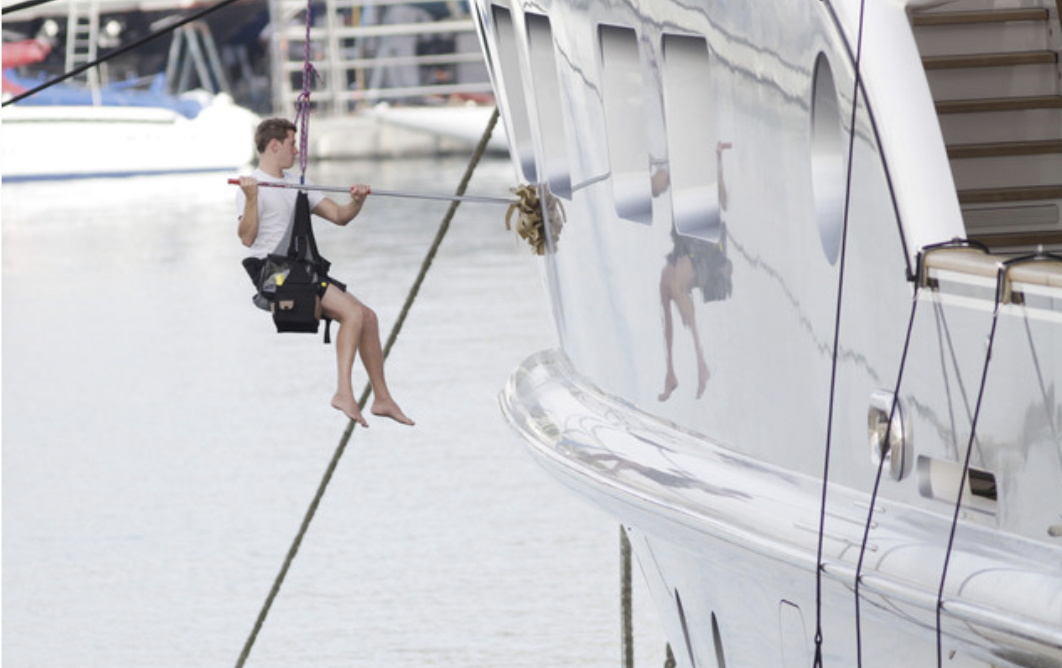
COURSE DATES
The course is 9 days in total and is reflected in the following order:
Superyacht Deckhand Course: Wed-Sat & Mon-Fri (9 days)
• Apr: 17-2 4 & 26*2024
• May: 15-18& 20-24 2024
• Jun: 19-22 & 24-28 2024
• Ju l : 17-20 & 22-26 2024
• Aug : 1 4-17 & 19-23 2024
• Sep : 11-14 & 16-20 2024
• Oct 09-12 & 14-18 2024
• Nov : 06-09 & 11-15 2024
• Dec : 04-07 & 09-13 2024
*Course run over Sunday due to public holiday
MCA Internationally recognised training to become a superyacht deckhand. This IYT Deckhand Training Course is a qualification, unlike the recreational sailing “Competent Crew” course which is being offered through other superyacht training providers.
The IYT Deckhand Training Course certification is the only internationally recognised qualification for deckhands. Your graduation certificate will be accredited by International Yacht Training (IYT) Worldwide, who has recognition with 25 governments across the globe.
The Superyacht Deckhand course will ensure students become job ready, receive resume and career advice, participate in interview role plays and undertake further crew management training. A deckhand carries out his or her duties under the direction and authority of the captain via the first officer and/or bosun. A deckhand’s duties include keeping the yacht’s exterior and deck equipment clean and exquisitely maintained, assisting in watch keeping and navigational support, guest services and docking procedures. Students will receive extensive training in these areas and the course provides the theoretical and practical skills required to be a successful crew member onboard a superyacht. Both power and sail superyacht skills are covered in the course, which will increase your opportunities for placement once you graduate.
Certification You Will Achieve
All successful graduates receive the following certification:
IYT – International
- MCA recognised IYT Superyacht Deck Crew including Small Powerboat/RIB Master & introduction to VHF radio operations. This IYT certificate is equivalent to the MCA’s ‘Yacht Rating Course’ and enables candidates to apply for an MCA ‘Yacht Rating Certificate’ with proof of STCW and 2 months sea service on vessels over 15 metres in load line length. For more information on this visit IYT’s website and their Superyacht Deck Crew Course page or contact us for more information. This is a certificate you can work towards achieving once employed in the industry. ***This IYT certificate is equivalent to the MCA’s ‘Yacht Rating Course’ and enables candidates to apply for an MCA ‘Yacht Rating Certificate’ with proof of STCW and 2 months sea service on vessels over 15 metres in load line length. For more information on this visit IYT’s website and their Superyacht Deck Crew Course page or contact us for more information. This is a certificate you can work towards achieving once employed in the industry.

AMSA – National
Our Internationally Recognised Certifications Are Your Entry To Getting A Job Aboard A Superyacht
The MCA recognised IYT Deckhand Training Course is the only internationally recognised qualification for superyacht deckhand crews. Your graduation certificate will be accredited by International Yacht Training (IYT) Worldwide, who has recognition with 25 governments across the globe. The RIB tender certificate is recognised by the Maritime Coastguard Agency (MCA).
The Superyacht Crew Academy has established over the years a global network with leading recruitment agencies overseas and within Australia. All of these Superyacht Crew recruitment agencies ‘acknowledge’ and welcome the IYT Professional Superyacht Interior Crew certification.
Prerequisites
Candidates must already hold the mandatory STCW95+10 certification. This is the entry-level course for superyacht crew and anyone with a reasonable command of the English language, who is over 18 years old, in good health, and without colour blindness can sign up for the course.
What Other Qualifications Will I Need?
NSW General Powerboat licence and NSW Personal Watercraft licence examinations can be organised to run as part of your Deckhand training. Please contact us to organise these certifications.
Our Superyacht Interior Crew & Deckhand Package course is the ultimate package and will provide you with all the theoretical and practical skills necessary to excel in a dual role. This combined package course enhances your employment opportunities and gives you the confidence to be employed in any entry level role onboard a Superyacht.
Other useful qualifications, like SCUBA diving, videography, photography, carpentry, strong swimming skills, watersport skills, will improve your Superyacht Crew Job prospects and make you a more valuable crew member. Outstanding physical endurance, athletic skills, and a pleasant disposition are important for a career aboard Superyachts.
Course Description:
Course Content: The course is a very hands on practical course where you will complete different tasks and duties, Students are required to participate in all practical tasks including taking command of the vessel.
Accommodation: Accommodation will be required to be arranged by the student. Check out our Student Accommodation section with recommended listings of local Airbnb or youth hostel accommodation during your course.
Sun Sense & Equipment: Please bring a hat, sunglasses, sun cream (also available onboard), change of clothes (minimal wardrobe needed), wet weather jacket, any special medicine you may need to take (we have a first aid kit aboard). Be sure to pack this in a flexible soft bag as there is no room aboard for hard luggage.
Training Location
The course is run from our Office in Warriewood Superyacht Crew Academy Training office at 25a/5 Ponderosa Parade , and our practical training facility in Newport 2 queens parade. The facilities are a 45min drive North of Sydney’s CBD. We offer a free shuttle between both facilities when needed.
Program for the Superyacht Deckhand Course
- Nautical Knowledge
- Lifting & Rigging
- Shipboard Safety
- Emergency Drills
- Vessel Manoeuvring
- Collision regulations
- Watchkeeping
- Introduction to weather
- Code of Safe Working Practices
- Compasses and chartwork
- Taking Bearings
- Fix vessels position
- Navigation Passage planning
- Night Watchkeeping
- Passage from fixed point back to Pittwater
- Night pilotage using IALA and blind navigation techniques
Superyacht Maintenance
- Brightwork/ Varnishing
- Preparation of Surfaces
- Application Techniques
- Product Knowledge
- Teak Maintenance
- Exterior Wash Down Techniques
- Servicing Deck Gear
- Maintenance Schedule
- Stainless Polishing
- Cleaning Windows
- Engine checks and maintenance
Vessel Handling
- Coming alongside wharves
- Mooring techniques
- Anchoring procedures
- Line handling and line throwing techniques
- Sails and sail handling
- Emergency Scenarios
- General seamanship
- Line throwing techniques
- Ropes, knots and splicing
- Fendering and tying up correctly
- Pre-launch/pre-departure checks
- Refuelling procedures
- RIB handling techniques under power
- Coming Alongside vessels and wharves
- MOB procedures
- Engine checks
- VHF radio practical
- Dinghy launching & recovery
- Bridge equipment
- Conducting safety briefing
- Lights/sound signals
- Vessel handling theory
- Anchors & anchoring
- Nautical terminology
- Emergency procedures
- VHF/HF radio operation
- Phonetic alphabet
The Superyacht Deckhand Course can be taken as a stand-alone course. Contact us for more information and pricing. Recognition of Prior Learning or Credit Transfer will apply to achieve the AMSA – National certification.
Enquire about this course.

Superyacht Crew Academy Provides training and certification for people who wish to work on Superyachts anywhere in the world and within the Australian Maritime Industry. Legal Name: Club Sail Pty. Ltd. Trading as: Superyacht Crew Academy Registered Training Organisation no. 91462
Unit 25a/5 Ponderosa Parade, Warriewood, NSW 2102, Australia.
+61 2 9979 9669
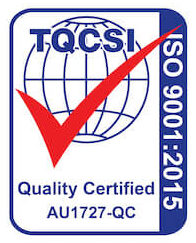)

Yacht Engineer Training Courses
MCA Superyacht / SV Engineer training for vessels up to 9000kW and 3000GT
Yacht / SV Engineer Training Overview
Although there are different training routes and licensing authorities/countries under which engineers may qualify to work on superyachts, a common, broadly accepted route is the MCA Engineer Small Vessel Training Route. The MCA recently changed its engineering qualification structure in order to simplify the number and level of qualifications across the industry. They have pulled together pre-existing qualifications, leading to certificates of competency (CoC) restricted to yachts (and other small vessels) only. This single generic qualification is now referred to as " Engineer Officer Small Vessel Certificate of Competency" .
Please consult a recognized training provider before booking any training courses and view the "Engineer Officer Small Vessel of Competency" Marine Information note, found on the MCA website.
Find info, requirements and links to yacht engineer training centres for:
- Junior / Assistant Engineer
- 2nd Engineer Officer < 9000kW
- Chief Engineer Officer < 9000kW
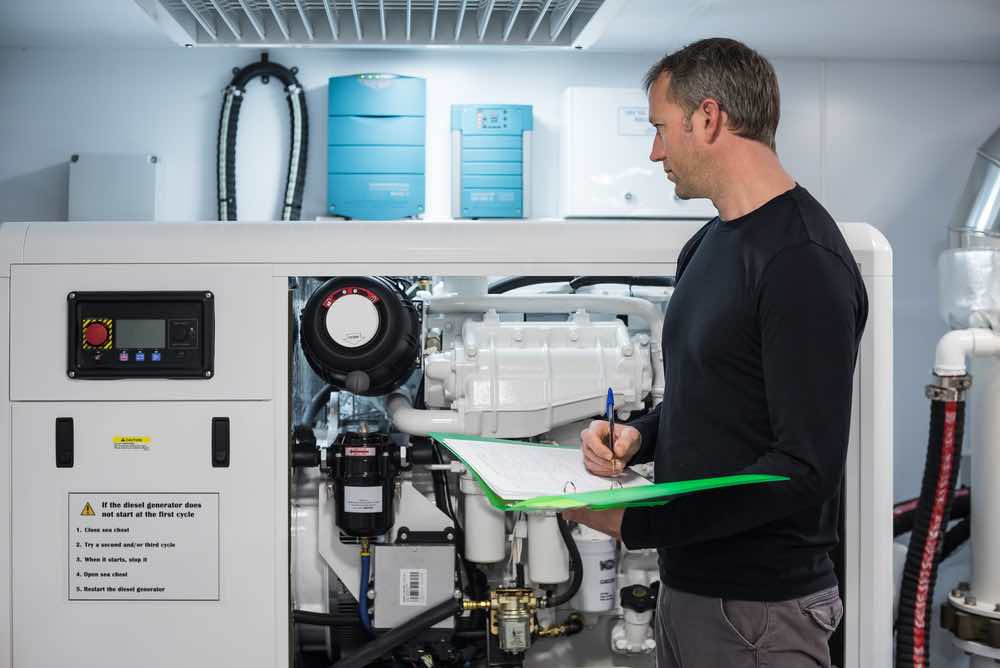
Junior / Assistant Engineer:
- An STCW : EVERY crew member onboard must hold a valid STCW
- An ENG1 Medical Certificate : EVERY crew member onboard must hold a valid ENG1
- AEC 1: The Approved Engine Course 1 is an entry-level qualification for the MCA engineering training schedule and is regarded as the first step on the ladder. It is generally a 5-day / 30-hour course that aims to provide candidates with practical basic hands-on training and theoretical knowledge of diesel engines. The main intention of this course is to teach the knowledge to serve in an ENTRY LEVEL capacity in the engineering department or for a crew member primarily working in another department to assist with engineering functions, for example, a deck/engineer. Holding an AEC certificate will allow you to be a chief engineer on a yacht over 24m and less than 200 Gross Tons or act as an assistant engineer on vessels over 200 GT up to 60NM from a safe haven.
- AEC 2: The Approved Engine Course II follows on from AEC I knowledge. It contains a more practical element when compared to the AEC I. This course has been designed so that engineering qualifications are transferable between different industry sectors such as yachts, workboats, tugs, fishing vessels and so on and there will no longer be offshore limits.
The AEC is your gateway ticket into becoming an engineer, it is, therefore, essential to hold this qualification, gain sea time and work on your training record book (TRB) in order to progress in the engine room.
Becoming a 2 nd Engineer:
There are three routes to obtaining a 2 nd Engineer Officer Small Vessel Certificate of Competency’ (Previously known as Y4):
- Standard Route
- Experienced Seafarer Route
- Alternative Route (For Graduate Engineers)
Standard Route:
This standard route benefits those who study through an accepted route of education involving MSQ (Maritime Studies Qualifications) modules. Completion of these will result in a Diploma in Maritime Studies: Small Vessel Engineer’. This route is extremely beneficial to superyacht engineers because of the reduced sea time required and because some of the syllabi can be completed on-board.
In order to follow this route, you must:
- Hold a Diploma in Maritime Studies: Small Vessel Engineer
- Complete Approved Engine Course I (AEC I) as well as The Approved Engine Course II (AEC II)
- Have completed 12 months’ combined sea service and workshop training, which must include: - 6 months’ seagoing service engaged in watchkeeping or Unmanned Machinery Space (UMS) duties on vessels of at least 350 kW; - 5 months’ seagoing service on vessels of at least 350 kW; - 2 weeks MCA-approved Initial Workshop Skills Training; - A further 2 weeks seagoing service on vessels of at least 350 kW or 2 weeks of MCA-approved additional Workshop Skills Training.
- Complete the MNTB Small Vessel Training Record Book (TRB)
- Complete the Diploma in Maritime Studies: Small Vessel Engineer
- Pass the MCA-approved written exams for - Marine Diesel Engineering ; - Auxiliary Equipment Part – 1 ; - Operational procedures, Basic Hotel Services and Ship construction
- Hold the applicable ancillary and safety courses: - All STCW Basic Training Modules - PSCRB - Advanced Fire Fighting - Proficiency in Medical First Aid - Human Element, Leadership and Management (Operational Level)
- Hold a valid ENG1 Medical Certificate or MCA accepted Equivalent
- Complete MCA oral examination for Second Engineer Officers on Small Vessels less than 9000 kW, less than 3000 GT, unlimited area, III/2 (syllabus available online, go to www.gov.uk and search “Small Vessel Oral Examination Syllabus”).
Experienced Seafarer Route:
This route is for existing seafarers serving on small vessels. You will not be required to complete the Diploma in Maritime Studies: Small Vessel Engineer , however you will need to complete a preparatory college course and SQA written examinations.
To be eligible to register for a study programme you must meet the following requirements:
- Have completed 24 months’ seagoing service on vessels of at least 200 kW
- Hold an Approved Engine Course (Both AEC 1 & AEC 2 )
- Hold STCW Basic Safety Training certificates: - Personal Survival Techniques (STCW Code A-VI/1-1) - Fire Prevention and Fire Fighting (STCW Code A-VI/1-2) - Elementary First Aid (STCW Code A-VI/1-3) - Personal Safety and Social Responsibilities (STCW Code A-VI/1-4)
Requirements / Notice Eligibility to sit MCA Oral Exam:
In addition to the above, candidates must complete the following in order to be issued with a notice of eligibility (noe) to sit an mca oral examination:.
- Additional 11 months’ seagoing on a vessel of 350 kW (must include a minimum of 6 months' seagoing service engaged in watchkeeping or UMS duties)
- 2 weeks MCA-approved initial Workshop Skills Training
- A further 2 weeks seagoing service on vessels of at least 350 kW or 2 weeks of MCA-approved additional Workshop Skills Training.
Certificate of Competency (Coc):
In addition to completing all of the experienced seafarer route requirements above, the candidate must:
- Complete and pass the following courses:
- MCA Marine Diesel Engineering
- MCA Auxiliary Equipment Part - 1
- Operational procedures, Basic Hotel Services and Ship Construction
2. Hold the applicable ancillary and safety course certificates listed in section 5:
- All STCW Basic Training Certificates - PSCRB - Advanced Fire Fighting - Proficiency in Medical First Aid - Human Element, Leadership and Management (HELM Operational Level)
3. Hold a valid ENG1 Medical or ENG1 Medical Equivalent Certificate 4. Pass the MCA oral examination for Second Engineer Officers on Small Vessels less than 9000 kW, less than 3000 GT, unlimited area, III/2 (syllabus available online, go to www.gov.uk and search “Small Vessel Oral Examination Syllabus”)
Alternative Route: (For Graduate Engineers:)
This route is for those candidates who hold a relevant engineering degree/diploma/apprenticeship. These qualifications should be sent to an MCA-approved training provider who will analyze their relevance and explain what the individual should do in order to obtain a 2 nd Engineer Officer Small Vessel CoC.
More information on the types of Graduate and Apprenticeship holders that qualify for this training route can be found in section 3.5 of the MIN 524 Notice .
If you are deemed eligible to enter into this programme you will need to apply directly to an MCA-approved nautical college. In order to find an appropriate college, search www.gov.uk for “MCA-approved nautical colleges".
In order to gain the Certificate of Competency you must:
- Complete a minimum of 6 months’ seagoing service engaged in watchkeeping duties
- Additional seagoing service / Workshop Skill training requirements based on the relevant HND, HNC or Engineering Apprenticeship, as laid out in point 3.5.3 of the MIN 534 Notice.
- Hold an Approved Engine Course I (AEC I)
- Hold an Approved Engine Course II (AEC II)
- Successfully Complete the MCA-approved modules and pass the corresponding exams for:- Marine Diesel Engineering - Auxiliary Equipment Part - 1 - Operational Procedures, Basic Hotel Services & Ship Construction
- Hold the applicable ancillary and safety course certificates:- All STCW Basic Training Certificates - PSCRB - Advanced Fire Fighting - Proficiency in Medical First Aid - Human Element, Leadership and Management (HELM Operational Level)
- Hold a valid ENG1 Medical or ENG1 Medical Equivalent Certificate
- Pass the MCA oral examination for Second Engineer Officers on Small Vessels.
Becoming a Chief Engineer :
- Chief Engineer 3000kw & <500GT
- Chief Engineer 9000kw & <3000GT
Chief Engineer Officer < 3000kW & 500GT
In order to qualify for the issue of this Certificate of Competency you must meet the following requirements:
- Complete a minimum of 6 months’ seagoing service as a Second Engineer on vessels of at least 350 kW (While holding an SV Second Engineer Officer < 9000kW & 3000GT STCW Convention regulation III/2 Certificate of Competency.
- Successfully complete the MCA- approved modules and pass the corresponding written examinations for - Chief Engineer Statutory and Operational Requirements - Auxiliary Equipment part - 2
- Hold the applicable ancillary and safety course certificates: - All STCW Basic Training Certificates - PSCRB - Advanced Fire Fighting - Proficiency in Medical First Aid - Human Element, Leadership and Management (HELM Management Level)
- Pass MCA oral examination for Chief Engineer Officer, less than 3000 kW, less than 500 GT, unlimited area, STCW Reg III/3
Chief Engineer SV <3000 GT & <9,000kW
- 24 months of seagoing service which must include:12 months as an SV Second Engineer or SV Chief Engineer while holding the applicable STCW Convention regulation III/2 Certificate of Competency:
- 6 months of sea service on 350 kW vessels & 6 months seagoing service on vessels 750 kW. (greater or equal to kW provided)
- Chief Engineer (SV) Statutory and Operational Requirements (Not required if SV Chief Engineer less than 3000 kW, less than 500 GT CoC already held)
- Chief Engineer (SV) Auxiliary Equipment Part 2 (Not required if SV Chief Engineer less than 3000 kW, less than 500 GT CoC already held)
- Applied Marine Engineering
- Complete either:a) MCA-approved modules and pass the corresponding written examinations for: General Engineering Science I & General Engineering Science II (exemptions may apply for candidates holding appropriate engineering degree) OR The Diploma in Maritime Studies: Small Vessel and the Diploma in Maritime Studies: Small Vessel Chief Engineer
- All STCW Basic Training Certificates
- Advanced Fire Fighting
- Proficiency in Medical First Aid
- Human Element, Leadership and Management (HELM Management Level)
- Pass the MCA oral examination for Chief Engineer Officer, less than 9,000 kW, less than 3,000 GT, unlimited area, STCW Reg III/3
FOR MORE INFO GO TO MCA WEBSITE MIN524
Alternative Routes to Become a Yacht Engineer:
The above method is the new MCA-approved and advised route to become a YACHT engineer, there are however other options available to you:
Experienced Marine Engineers: Marine engineers with qualifications for larger vessels, such as commercial tankers, container vessels, dredgers etc. or those with merchant navy tickets are usually able to work on yachts with these tickets. It is important to contact the MCA who will review these qualifications and ascertain a plan of action for you.
USCG: It is also possible to qualify as a yacht engineer through the United States Coast Guard route, again different flag states will have different requirements and it is advisable to contact the MCA for any further advice or information.
Find a Training Course Provider
Select a Course in order to view all training providers (use the location filter on the results page in order to refine your search).
STCW Basic Training Advanced Fire Fighting Approved Engine Course (AEC) HELM General Engineering Science 1 General Engineering Science 2 Proficiency in Medical First Aid SV Marine Diesel Engineering Proficiency in Survival Craft & Rescue Boats (PSCRB) SV Auxiliary Equipment SV Operational Procedures SV Applied Marine Engineering
Username or Email Address *
Remember me Lost your password?
Username or Email
Get New Password

IMAGES
VIDEO
COMMENTS
The skills of a successful yacht Captain include: Excellent leadership, management and diplomacy skills. Excellent yacht handling and navigation. Ability to stay calm in difficult situations. Good grasp of finance and legislation. Excellent communication and interpersonal skills. Organisation and administration skills.
Knowledge Requirements. Becoming a superyacht captain is a highly sought-after and rewarding career path. Aspiring captains must possess a combination of technical knowledge, experience on the water, and a deep understanding of the industry. The most important knowledge requirement for a superyacht captain is a Merchant Marine Officer License.
Captain. At the top of the Superyacht crew hierarchy, the Captain of a Superyacht works under the vessel's owner or their representatives. ... Additionally, you must undertake a number of other qualifications and demonstrate a variety of knowledge and skills, including seafaring, admin, IT, health and safety, and even accounting.
As a rule, the smaller the yacht, the more hands-on the Captain must be. The larger the yacht, the more administrative duties the Captain will hold. A superyacht Captain specialises in commanding and managing luxury yachts over 24 metres in length. Every crew member falls under the ultimate command of the Captain and will answer to him/her.
Building an effective culture and maintaining the highest standards of professionalism and safety whist complying to all regulatory requirements. Managing expectations of owners and other stakeholders such as management companies, is another key part of being a successful captain.". The smaller the yacht, the more hands-on the Captain must be.
The captain must hold a license that is commensurate with the gross tonnage of the vessel and approved by the flag state. In addition, the yacht's insurance company needs to be comfortable with the candidate's experience and license and approve the hire. This is understandable when you consider that the underwriter is the biggest financial ...
1. Understand the Training Requirements. The foundational step to becoming a deckhand in Australia is to complete the necessary safety training. While the training is broadly similar across different countries, there are specific requirements for those intending to work on commercial vessels within Australia:
How do I become a Captain? Qualifications and training. As with the Chief Mate position, in order to secure a position as a superyacht captain you will need to have the relevant Certificate of Competency: in this case, the Master Yachts <500GT/<3000GT Certificate of Competency. Unsurprisingly, this has a highly thorough process to back it up ...
Becoming a yacht captain. You now have all the necessary qualifications - there are no more modules. However, you still need to perform an additional 12 months of sea time, and 120 days of sea service. The final step is getting your MCA Master 3000 certification, a process that consists of an oral exam only.
Speaks multiple languages fluently. New build experience. Project Management certification or Management degree. Limited experience in intended cruising area. Lack of experience on a similar size vessel. Yacht Captains have 5+ years experience and are responsible for the safety of passengers, crew & vessel. They earn $84K-180K based on yacht ...
The below super yacht Captain salary guideline is based on my personal research using an average of over 10 major yachting platforms: 20m-30m: $4000-$7500 p/m; 30m-40m: $5500-$9500 p/m; ... If you pass all the modules and have met the requirements for the Master 3000GT, you can skip the Master 500gt Course and do the exam and oral for the ...
The minimum qualifications for a yacht Captain position include: 3-5 years' experience as a Chief Officer/Mate. 5+ years' experience as a Yacht Captain for larger yachts. License depending on the tonnage of the yacht. Some Owners and insurance companies may require more than is required by maritime law.
It is the organisation responsible for maritime safety in the UK. This role encompasses setting the standard for training and certification for seafarers, including the minimum requirements for certification of superyacht crew. The MCA is an agency of the Department for Transport of the British Government. Even if you have completed similar ...
The specific qualifications can vary depending on your location and the type of yacht you wish to captain. Common requirements include accumulating sea time, completing relevant training courses (such as navigation, safety, and emergency response), and passing licensing exams.
For Kelly Gordon, captaining a superyacht was something she never imagined until she had already started a career as a chemistry professor when a chance encounter at a party on a large motor yacht changed everything. Now, having uncovered her passion for the sea and having achieved the ultimate position as a superyacht captain, Gordon is not only a role model for female crew who want to pursue ...
About Us. Superyacht Crew Academy is a registered training organisation and industry leader, offering fully accredited courses to enable your qualifications to take you anywhere you want to go. Both International and Australian recognised competencies will place you into your dream of working on a Superyacht or in the Maritime industry across a ...
1. ENG1 Medical certificate. First things first, you'll need to get your ENG1 Medical certificate - something that is required of all " seafarers .". In a nutshell, this certificate demonstrates that you have the level of health and fitness required to carry out work on board a Superyacht safely, both in your day-to-day role and in ...
Superyacht Cadetship course stages. Phase 1 - Essential Cadetship training to launch your superyacht career - 160 days (academic study). The Cadet will develop skills and knowledge of seamanship and safety as well as industry qualifications. Mentoring and guidance will help the Cadet obtain entry-level deck positions on superyachts, progressing into long-term opportunities within the sector.
Yacht Crew work within four main departments, Deck, Engineering, Interior and Galley (kitchen), some vessels, may also require a Purser, and / or specialists. Within each department there is a progression from junior levels up to head of departments, with the Captain being the highest-ranking person onboard.
The Superyacht Deckhand course will ensure students become job ready, receive resume and career advice, participate in interview role plays and undertake further crew management training. A deckhand carries out his or her duties under the direction and authority of the captain via the first officer and/or bosun.
2. Gain Experience. In order to obtain your license you must log at least 360 days at sea within the course of five consecutive years. A day at sea is defined as four consecutive hours. Even if you are not directly captaining or assisting the captain, the hours can still count towards your credentialing.
The overall cost of getting your captain's license to operate commercial vessels can be anywhere from $500 to $800 or more depending on the course you choose. These costs will include your exam expenses, license requirements and additional fees associated with your license application. 6.
3. Hold a valid ENG1 Medical or ENG1 Medical Equivalent Certificate. 4. Pass the MCA oral examination for Second Engineer Officers on Small Vessels less than 9000 kW, less than 3000 GT, unlimited area, III/2 (syllabus available online, go to www.gov.uk and search "Small Vessel Oral Examination Syllabus")